*NURSING > QUESTIONS & ANSWERS > Mental Health Disorders Medication NCLEX Questions. Graded A (All)
Mental Health Disorders Medication NCLEX Questions. Graded A
Document Content and Description Below
Mental Health Disorders Medication NCLEX Questions The client with a major depressive disorder taking the selective serotonin reuptake inhibitor (SSRI) fluoxetine (Prozac) calls the psychiatric c... linic and reports feeling confused and restless and having an elevated temperature. Which action should the psychiatric nurse take? 1. Determine if the client has flulike symptoms 2. Instruct the client to stop taking the SSRI 3. Recommend the client take the medication at night. 4. Explain that these are expected side effects The client diagnosed with a major depressive disorder asks the nurse, "Why did my psychiatrist prescribe an SSRI medication rather than one of the other types of anti-depressants?" Which statement by the nurse would be most appropriate? 1. "Probably it is the medication that your insurance will pay for" 2. "You should ask your psychiatrist why the SSRI was ordered" 3. "SSRIs have fewer side effects than the other classifications" 4. "The SSRI medications work faster than the other medications" The client diagnosed with pneumonia is admitted to the medical unit. The nurse notes the client is taking an antidepressant medication. Which data best indicate the antidepressant therapy is effective? 1. The client reports a "2" on a 1-10 scale, with 10 being very depressed 2. The client reports not feeling very depressed today 3. The client gets out of bed and completes activities of daily living 4. The client eats 90% of all meals that are served during the shift The client diagnosed with depression is prescribed phenelzine (Nardil), a monoamine oxidase (MAO) inhibitor. Which statement by the client indicates to the nurse the medication teaching is effective? 1. "I am taking the herb ginseng to help my attention span" 2. "I drink extra fluids, especially coffee and iced tea" 3. "I am eating three well-balanced meals a day" 4. "At a family cookout I had chicken instead of a hotdog" The client with major depressive disorder is suicidal. The client was prescribed the tricyclic antidepressant imipramine (Tofranil) 3 weeks ago. Which priority intervention should the nurse implement? 1. Determine if the client has a plan to commit suicide 2. Assess if the client is sleeping better at night 3. Ask the family if the client still wants to kill himself or herself 4. Observe the client for signs of wanting to commit suicide The client with major depressive disorder has been taking amitriptyline (Elavil), a tricyclic antidepressant, for more than 1 year. The client tells the psychiatric clinic nurse that the client wants to quit taking the antidepressant. Which intervention is most important for the nurse to discuss with the client? 1. Ask questions to determine if the client is still depressed 2. Ask the client why he or she wants to stop taking the medication 3. Tell the client to notify the HCP before stopping medication 4. Explain the importance of tapering off the medication The client with major depressive disorder is prescribed nefazodone (Serzone), an atypical antidepressant. The client tells the nurse, "I am going to take my medication at night instead of in the morning." Which statement would be the nurse's best response? 1. "You really should take the medication in the morning for the best results" 2. "It is all right to take the medication at night. It may help you sleep at night" 3. "The medication should be taken with food so you should not take it at night" 4. "Have you discussed taking the medication at night with your psychiatrist?" The client admitted to the psychiatric unit for major depressive disorder with an attempted suicide is prescribed an antidepressant medication. Which interventions should the psychiatric nurse implement? SELECT ALL THAT APPLY. 1. Assess the client's apical pulse and blood pressure 2. Check the client's serum antidepressant level 3. Monitor the client's liver function status 4. Provide for and ensure the client's safety 5. Evaluate the effectiveness of the medication Many antidepressants may cause hepatotoxicity; therefore, the nurse should monitor the client's liver function tests. The nurse should ensure the client's safety. Many antidepressants may cause orthostatic hypotension and increase the risk for dizziness, falls, and injuries The client diagnosed with major depression who attempted suicide is being discharged from the psychiatric facility after a 2-week stay. Which discharge intervention is most important for the nurse to implement? 1. Provide the family with the phone number to call if the client needs assistance 2. Encourage the client to keep all follow-up appointments with the psychiatric clinic 3. Ensure the client has no more than a 7-day supply of antidepressants 4. Instruct the client not to take any over-the-counter medications without consulting with the HCP The client prescribed an antidepressant 1 week ago tells the psychiatric clinic nurse, "I really don't think this medication is helping me." Which statement by the psychiatric nurse would be most appropriate? 1. "Why do you think the medication is not helping you?" 2. "You think your medication is not helping you?" 3. "You need to come to the clinic so we can discuss this." 4. "It takes about 3 weeks for your medication to work" Which statement indicates the client diagnosed with bipolar disorder who is taking lithium (Eskalith), an anti mania medication, understands the medication teaching? 1. "I will monitor my daily lithium level." 2. "I will make sure I do not get dehydrated." 3. "I need to taper the dose if I quit taking it." 4. "I need to take the medication on an empty stomach." The nurse is preparing to administer lithium (Eskalith), an antimania medication, to a client diagnosed with bipolar disorder. The lithium level is 1.4 mEq/L. Which action should the nurse implement? 1. Administer the medication 2. Hold the medication 3. Notify the health-care provider 4. Verify the lithium level To which client would the nurse question administering lithium (Eskalish), an antimania medication? 1. The 54-year-old client on a 4-g sodium diet 2. The 23-year-old client taking an antidepressant medication 3. The 42-year-old client taking a loop diuretic 4. The 30-year-old client with a urine output of 40 mL/hour The 24-year-old female client with bipolar disorder is prescribed valproic acid (Depakote), an anticonvulsant medication. Which question should the nurse ask the client? 1. "Have you ever had a migraine headache?" 2. "Are you taking any type of birth control?" 3. "When was the last time you had a seizure?" 4. "How long since you have had a manic episode?" The client diagnosed with bipolar disorder is taking lithium (Eskalith), an anti mania medication. Which statement by the client warrants further clarification by the nurse? 1. "I will limit the amount of caffeine I drink." 2. "I really enjoy playing soccer on weekends." 3. "I will drink at least 2000 mL of water a day." 4. "I need to call my HCP if I develop diarrhea." The client with bipolar disorder who is taking lithium (Eskalith), an anti mania medication, has a lithium level of 3.1 mEq/L. Which treatment would the nurse expect the health-care provider to prescribe? 1. No treatment because this is within the therapeutic range. 2. Intravenous therapy with an 18-gauge angiocath 3. Preparation for immediate hemodialysis 4. The antidote for lithium toxicity The client with bipolar disorder is prescribed carbamazepine (Tegretol), an anticonvulsant. Which data indicates the medication is effective? 1. The client is able to control extremes between mania and depression 2. The client's serum Tegretol level is within the therapeutic range 3. The client reports a "3" on a depression scale of 1-10, with 10 indicating severely depressed 4. The client has a decrease in delusional thoughts and hallucinations The client with bipolar disorder who is prescribed lithium (Eskalith), an anti mania medication, is admitted to the psychiatric unit in an acute manic state. Which intervention should the nurse implement first? 1. Determine the client's serum lithium level 2. Assess why the client quit taking the lithium 3. Implement care for the client's physiological needs 4. Administer a stat dose of lithium to the client Which information should the nurse discuss with the client diagnosed with bipolar disorder who is taking the anticonvulsant carbamazepine (Tegretol)? 1. Instruct the client to use a soft-bristled toothbrush 2. Encourage the client to get ophthalmic examinations annually. 3. Teach the client to monitor the blood pressure daily. 4. Tell the client to avoid hazardous activities The client diagnosed with bipolar disorder is prescribed lithium (Eskalith), an antimania medication. Which interventions should the nurse discuss with the client? SELECT ALL THAT APPLY. 1. Monitor serum therapeutic levels 2. Maintain an adequate fluid intake 3. Decrease sodium intake in diet 4. Do not take medication if the radial pulse is <60 5. Explain ways to prevent orthostatic hypotension Lithium is a salt and may cause dehydration; therefore, the client should maintain an adequate fluid intake of at least 2000 mL or more a day The client admitted to the psychiatric unit diagnosed with schizophrenia is prescribed clozapine (Clozaril), an atypical antipsychotic. Which laboratory data should the nurse evaluate? 1. The client's clozapine therapeutic level 2. The client's white blood cell count 3. THe client's red blood cell count The client admitted to the psychiatric unit experiencing hallucinations and delusions is prescribed risperidone (Risperdal), an atypical antipsychotic. Which intervention should the nurse implement? 1. Provide the client with a low tyramine diet 2. Assess the client's respiration for 1 full minute 3. Instruct the client to change positions slowly 4. Monitor the client's intake and output The male client diagnosed with schizophrenia is prescibed ziprasidone (Geodon), an atypical antipsychotic. Which statement to the nurse indicates the client understands the medication teaching? 1. "I need to keep taking this medication even if I become impotent." 2. "I should not go out in the sun without wearing protective clothing." 3. "This medication may cause my breast size to increase." 4. "I may have trouble sleeping when I take this medication" The client diagnosed with schizophrenia is prescribed clozapine (Clozaril), an atypical antipsychotic. Which information should the nurse discuss with the client concerning this medication? 1. Discuss the need for regular exercise 2. Instruct the client to monitor for weight loss 3. Tell the client to take the medication with food 4. Explain to the client the need to decrease alcohol intake The client with paranoid schizophrenia is prescribed aripiprazole (Abilify), a dopamine system stabilizer (DDS). Which statement best describes the scientific rationale for administering this medication? 1. It decreases the anxiety associated with hallucinations and delusions 2. It increases the dopamine secretion in the brain tissue to improve speech 3. It reduces positive symptoms of schizophrenia and improves negative symptoms 4. It blocks the cholinergic receptor sites in the diseased brain tissue Which information should the nurse discuss with the client diagnosed with schizophrenia who is prescribed an antipsychotic medication? 1. Drink decaffeinated coffee and tea 2. Decrease the dietary intake of salt 3. Eat six small, high-protein meals a day 4. Limit alcohol intake to one glass of wine a day The nurse is discussing the prescribed antipsychotic medication with a family member of a client diagnosed with schizophrenia. Which information should the nurse discuss with the family member? 1. Explain the need for the family member to give the client the medication 2. Encourage the family member to learn cardiopulmonary resuscitation (CPR0. 3. Discuss the need for the client to participate in a community support group 4. Teach the family member what to do in case the client has a seizure Which assessment data indicates the atypical antipsychotic quetiapine (Seroquel) is effective for the client diagnosed with paranoid schizophrenia? 1. The client does not exhibit any tremors or rigidity 2. The client reports a "2" on an anxiety scale of 1-10 3. The family reports the client is sleeping all night 4. The client denies having auditory hallucinations The client diagnosed with paranoid schizophrenia has been taking haloperidol (Haldol), a conventional antipsychotic, for several years. Which statement indicates the client needs additional teaching concerning this medication? 1. "I know that if I have any rigidity or tremors I must call my HCP." 2. "I eat high-fiber foods and drink extra water during the day." 3. "I am more susceptible to colds and the flu when taking this medication." 4. "This medication will make my hallucinations and delusions go away." The 43-year-old female client diagnosed with schizophrenia has been taking the conventional antipsychotic medication chlorpromazine (Thorazine) for 20 years. Which assessment data would warrant discontinuing the medication? 1. The client has had menstrual irregularities for the last year 2. The client has to get up very slowly from a sitting position 3. The client complains of having a dry mouth and blurred vision 4. The client has fine, wormlike movements of the tongue The client diagnosed with a general anxiety disorder is prescribed alprazolam (Xanax), a benzodiazepine. Which information should the clinic nurse discuss with the client? 1. Explain to the client that this medication is for short-term use. 2. Inform the client that rage and excitement are expected side effects 3. Tell the client to avoid foods that are high in vitamin K 4. Instruct the client to take the medication with at least 8 ounces of water The female client taking lorazepam (Ativan), a benzodiazepine, for panic attacks tells the clinic nurse that she is trying to get pregnant. Which action should the nurse take first? 1. Tell the client to inform the obstetrician of taking Ativan. 2. Instruct the client to quit taking the medication 3. Determine how long the client has been taking the medication 4. Encourage the client to stop taking Ativan prior to getting pregnant The nurse is preparing to administer the benzodiazepine alprazolam (Xanax) to a client who has a generalized anxiety disorder. Which intervention should the nurse implement prior to administering the medication? 1. Assess the client's apical pulse 2. Assess the client's respiratory rate 3. Assess the client's anxiety level 4. Assess the client's blood pressure The client diagnosed with obsessive-compulsive disorder is prescribed the selective serotonin reuptake inhibitor (SSRI) sertraline (Zoloft). Which statement indicates the client understands the medication teaching? 1. "If I get a headache or become nauseated, I will notify my HCP." 2. "It will take a couple of months before I see a change in my behavior." 3. "I need to be careful because SSRIs may cause physical addiction." 4. "I am glad I do not need to go to my psychologist's appointments." The client who returned from the war 1 month ago is diagnosed with posttraumatic stress disorder (PTSD) and prescribed paroxetine (Paxil), an SSRI. The client asks the nurse, "Will this medication really help me? I don't like feeling this way." Which statement is the nurse's best response? 1. "The medication will make you feel better within a couple of days." 2. "Why do you think the medication won't help you feel better?" 3. "Nothing really helps PTSD unless you go to counseling weekly." 4. "Because the traumatic event was within 1 month, the Paxil should be helpful." The elderly client diagnosed with a panic attack disorder is in the busy day room of a long-term care facility and appears anxious, is starting to hyperventilate, is trembling, and is sweating. Which action should the nurse implement first? 1. Administer the benzodiazepine alprazolam (Xanax) 2. Assess the client's vital signs 3. Remove the client from the day room 4. Administer the selective serotonin reuptake inhibitor (SSRI) sertraline (Zoloft) The client with an anxiety disorder is prescribed the anxiolytic alprazolam (Xanax). The client calls the clinic and reports a dizzy, weak feeling when getting out of the chair. Which action should the nurse take? 1. Instruct the client to quit taking the medication 2. Make an appointment for the client to come to the clinic 3. Determine if the client is drinking enough fluids 4. Discuss ways to prevent orthostatic hypotension The conscious client was admitted to the emergency department with an overdose of the anxiolytic alpraxolam (Xanax). Which intervention should the nurse implement first? 1. Prepare to administer an emetic with activated charcoal 2. Request a mental health consultation for the client 3. Prepare to administer the antidote flumazenil (Romazicon) IV 4. Determine why the client chose to overdose on the medication The client is receiving the anxiolytic alprazolam (Xanax) for a generalized anxiety disorder. Which assessment data best indicates the medication is effective? 1. The client reports not feeling anxious 2. The client's pulse is not greater than 100 3. The client's respiratory rate is not greater than 22 4. The client reports a "1" on a 1-10 anxiety scale The client is having a CT scan and starts having a severe anxiety attack. The HCP prescribed the anxiolytic diazepam (Valium), intravenous push. Which action should the nurse implement? 1. Dilute the Valium with normal saline and administer IVP 2. Do not dilute the Valium and inject in a port closest to the client 3. Inject the Valium into a 50-mL normal saline bag and infuse 4. Question the order because Valium should not be administered IV The male client diagnosed with chronic obstructive pulmonary disease (COPD) is admitted to the medical unit. During the admission process the client tells the nurse that he cannot sleep without Valium, a benzodiazepine, every night. Which action should the nurse take? 1. Inform the client that clients with COPD should not take Valium 2. Ask the client when was the last time he had any seizure activity 3. Determine what effect the Valium has on the client when he takes it 4. Ask the health-care provider for an order for Valium The elderly client being prepared for major abdominal surgery has been taking alprazolam (Xanax), a benzodiazepine, PRN for many years for nerves. Which information should the nurse discuss with the HCP? 1. Discuss prescribing another benzodiazepine medication postoperatively 2. Make sure that the alprazolam (Xanax) is ordered after surgery 3. Taper the medication to prevent complications 4. Change the alprazolam (Xanax) to a medication for sleep The client diagnosed with insomnia is scheduled for sleep studies. Which medication should the nurse instruct the client not to take? 1. The ACE inhibitor captopril. 2. The antihistamine diphenhydramine 3. The loop diuretic furosemide 4. The thyroid medication levothyroxine The health-care provider has prescribed lorazepam (Ativan), a benzodiazepine, for a female client receiving chemotherapy who complains of inability to sleep. Which information should the nurse teach the client? 1. Do not attempt to become pregnant while taking Ativan 2. Avoid consuming too much alcohol while taking Ativan 3. Try exercising to tire yourself just before bedtime 4. Do not take the medication too long to avoid addiction The client diagnosed with narcolepsy is prescribed methylphenidate (Ritalin), an amphetamine. Which information should the nurse teach the client? 1. Take the medication early in the day 2. The medication should be taken at bedtime 3. Keep the medication in a locked cabinet 4. Notify the HCP if there is a decrease in appetite The male client is diagnosed with narcolepsy. Which over-the-counter preparations should the nurse teach the client about? 1. Caffeinated beverages and diphenhydramine (Benadryl) 2. Flavored water and beta carotene 3. Milk with added vitamin D and saw palmetto 4. Carbonated sodas and black cohosh The 10-year-old client has begun to sleepwalk, a parasomnia disorder. Which information should the nurse provide the parents of the child? SELECT ALL THAT APPLY. 1. Give the child a mild sedative 2 hours before bedtime 2. Place a lock on the outer door out of the child's reach 3. Make the child wake up when an episode occurs. 4. Have the child practice guided imagery before bedtime 5. Administer atomoxetine (Strattera) every morning The client has Pickwickian syndrome and falls asleep at inappropriate times. Which medication should the nurse prepare to administer? 1. Maximum Strength NoDoz, a caffeine drug 2. An inhaled steroid in a bi-pap machine for nighttime sleep 3. Modafinil (Provigil), a central nervous system stimulant 4. Amitriptyline (Elavil), a tricyclic antidepressant The client who is a chronic alcoholic is admitted to the medical unit for pneumonia. Which medication would the nurse expect the health-care provider to prescribe to prevent delirium tremens? 1. Chlordizaepoxide (Librium), a benzodiazepine 2. Thiamine (vitabine B1), a vitamin 3. Disulfiram (Antabuse), an abstinence medication 4. Fluoxetine (Prozac), an antidepressant For which client would the nurse expect the health-care provider to prescribe methadone, an abstinence medication? 1. A client addicted to cocaine 2. A client addicted to heroin 3. A client addicted to amphetamines 4. A client addicted to hallucinogens The client is discussing wanting to quit smoking cigarettes with the clinic nurse. Which intervention is most successful in helping the client to quit smoking cigarettes? 1. Encourage the client to attend a smoking cessation support group 2. Discuss tapering the number of cigarettes smoked daily 3. Instruct the client to use nicotine replacement therapy, such as a patch 4. Explain that clonidine can be taken daily to help decrease withdrawal symptoms The client is prescribed methadone, an opiate agonist. Which intervention should the nurse discuss with the client? 1. Take the medication on an empty stomach 2. Decrease the fiber in the diet while taking the medication 3. Do not take methadone if the radial pulse is less than 60 4. Learn how to prevent orthostatic hypotension The client has been taking alprazolam (Xanax), a benzodiazepine, daily for the last 2 years. Which signs or symptoms would warrant intervention by the nurse? 1. Nausea, vomiting, and agitation 2. Yawning, rhinorrhea, and cramps 3. Disorientation, lethargy, and craving 4. Ataxia, hyperpyrexia, and respiratory distress To which client would it be most appropriate to prescribe disulfiram (Antabuse), an abstinence medication? 1. A client with chronic alcoholism admitted to the medical unit 2. A highly motivated client who wants to quit drinking alcohol 3. A client who has been taking amphetamines for more than 1 year 4. A highly motivated client who wants to quit taking heroin A client in the medical unit has been NPO for 3 days and is complaining of a headache. Which question should the nurse ask the client in regard to determining the reason for the headache? 1. "Do you eat a diet high in glucose?" 2. "How often do you drink alcohol?" 3. "Do you take sleeping pills regularly?" 4. "How often do you drink caffeinated beverages?" The male client with chronic alcoholism comes to the emergency department (ED) reporting he has not had an alcoholic drink in more than 1 week. Which action should the ED nurse implement first? 1. Implement seizure precautions according to hospital policy 2. Rehydrate the client with large amounts of intravenous fluids 3. Discuss withdrawal treatment in a hospital environment 4. Administer thiamine (Vitamin B1) through an intravenous route The client with a staggering gait is brought to the emergency department by a friend. The client is short of breath and has an oral temperature of 104 degrees. Which question should the nurse ask the client's friend? 1. "How many alcohol drinks has your friend had today?" 2. "When was the last time your friend took amphetamines?" 3. "Has your friend been inhaling any type of paint thinner?" 4. "Through which route and at what time did your friend take cocaine?" Which pharmacologic intervention should the nurse discuss with the client who is requesting help to quit smoking marijuana? 1. Explain that there is no specific pharmacologic intervention 2. Instruct the client to use a nicotine patch or chew nicotine gum 3. Encourage the client to have the HCP prescribe an antianxiety medication 4. Discuss tapering dronabinol (Marinol) over a 2-week time period [Show More]
Last updated: 1 year ago
Preview 1 out of 24 pages

Document information
Connected school, study & course
About the document
Uploaded On
Feb 02, 2020
Number of pages
24
Written in
Additional information
This document has been written for:
Uploaded
Feb 02, 2020
Downloads
1
Views
109


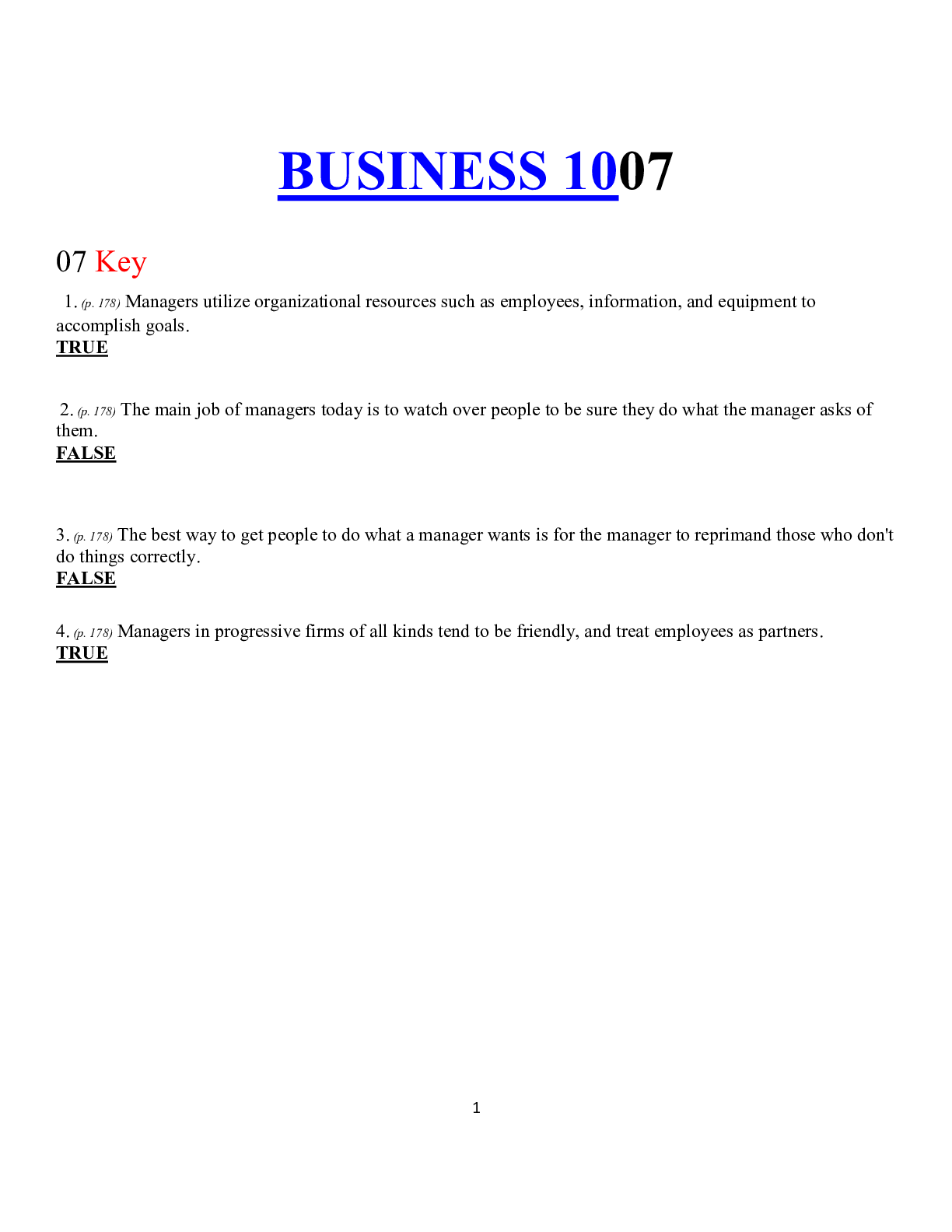
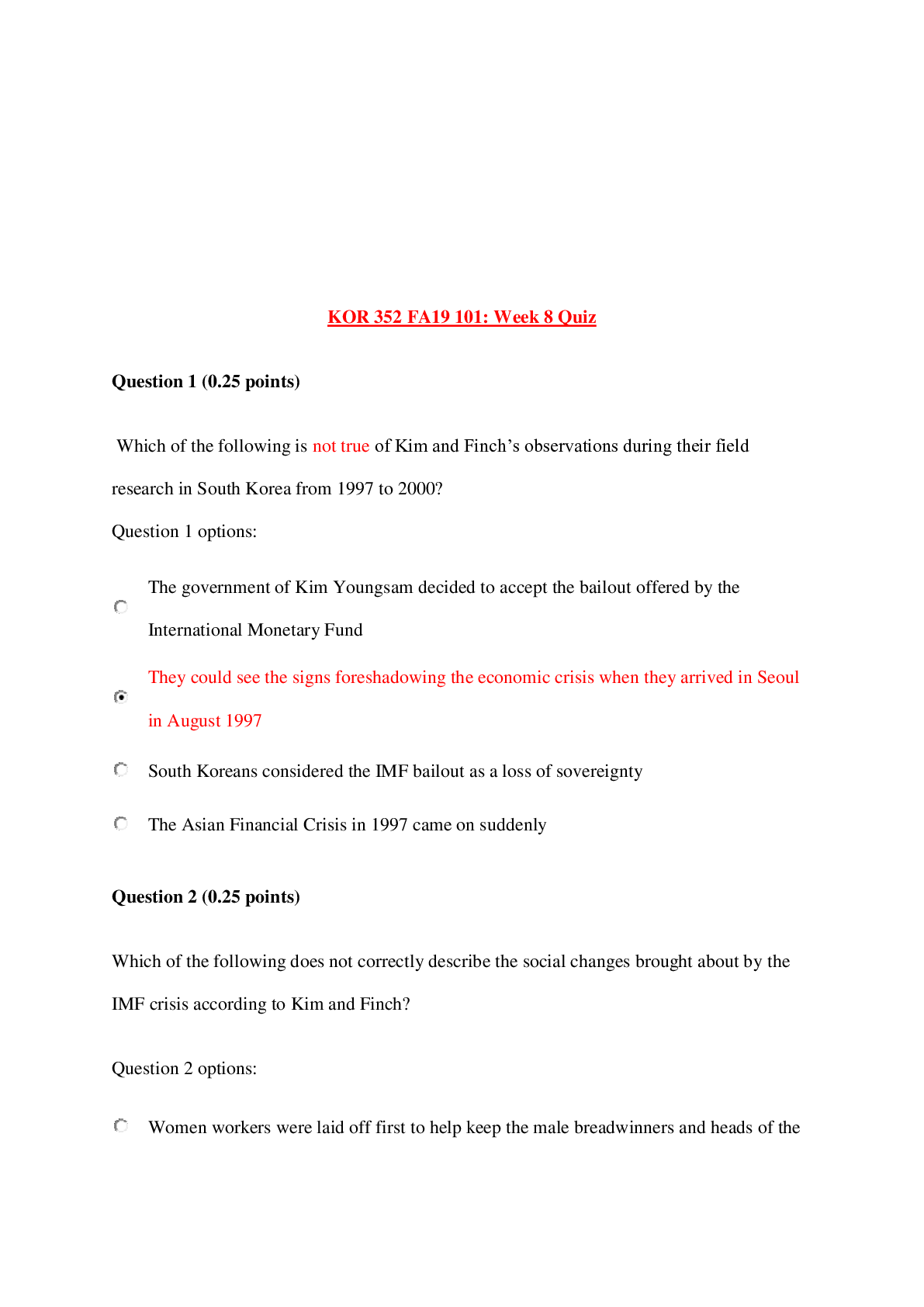
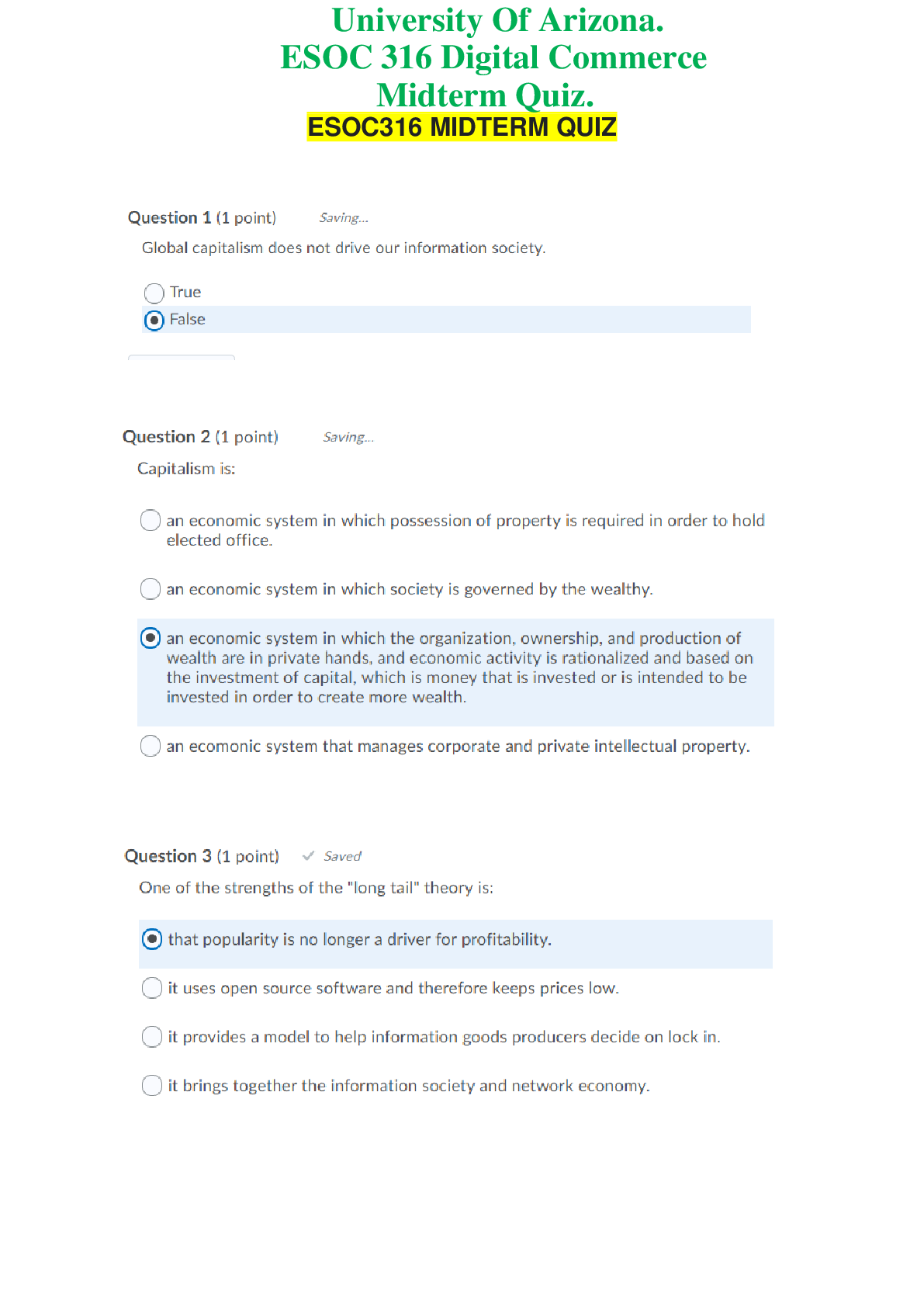
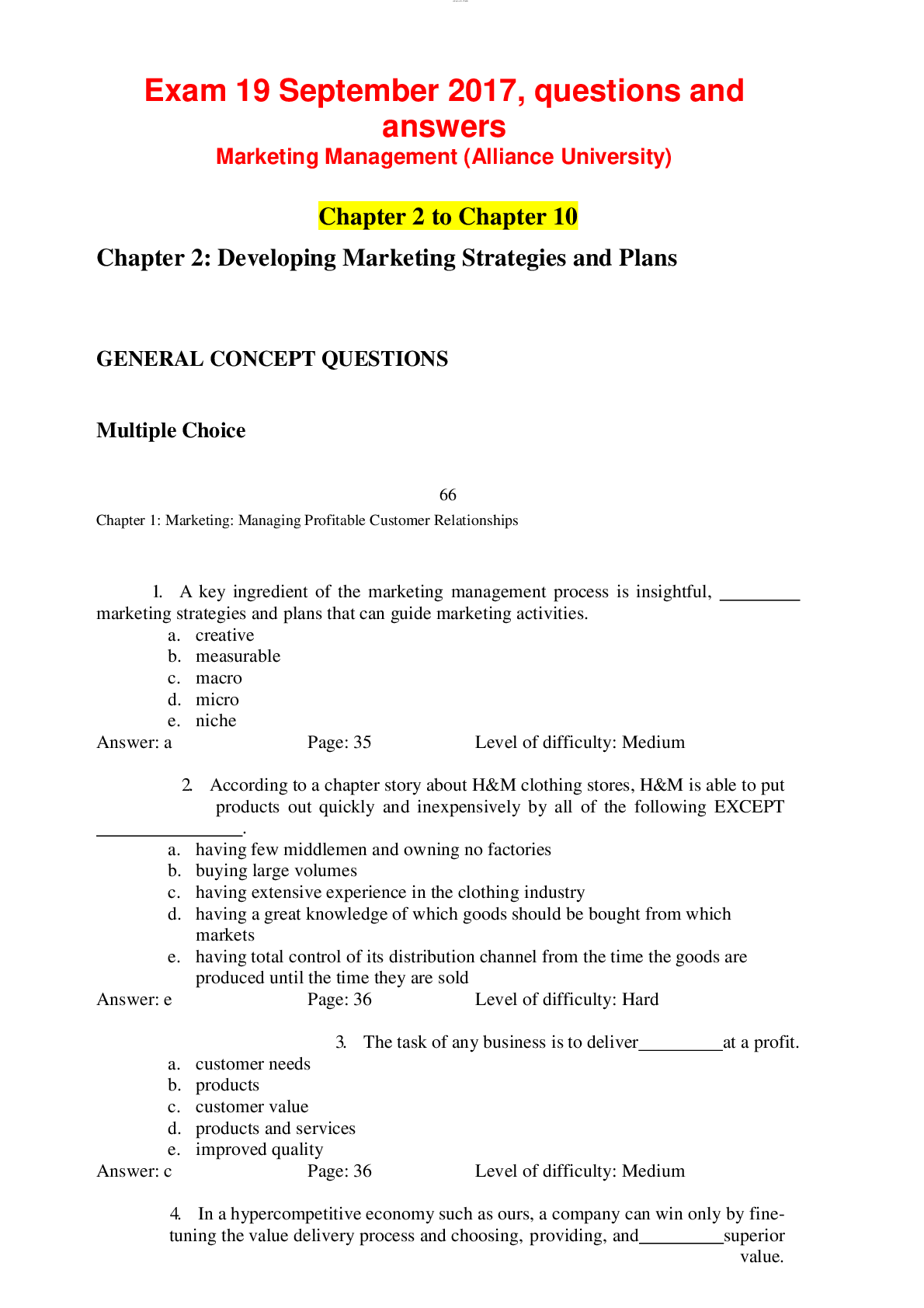
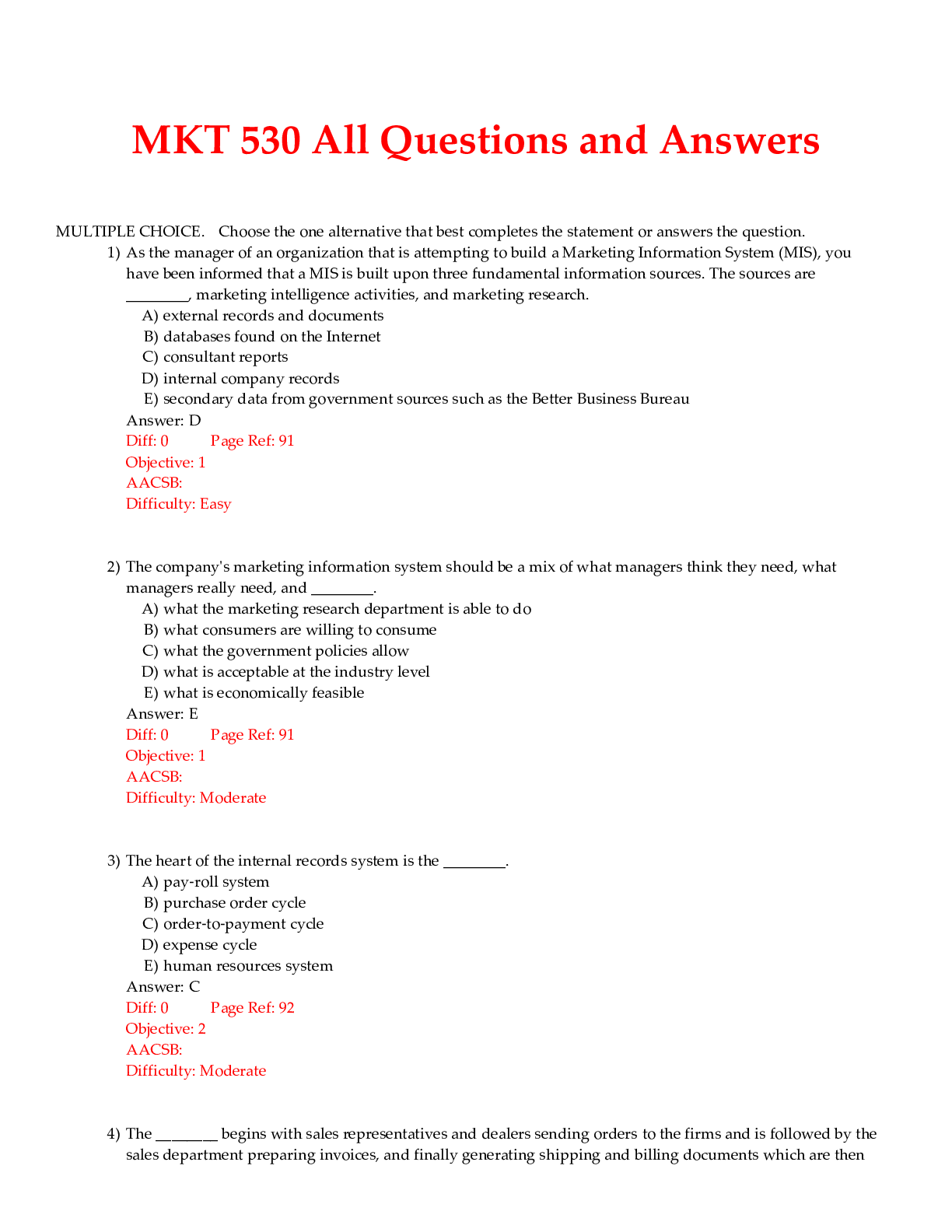
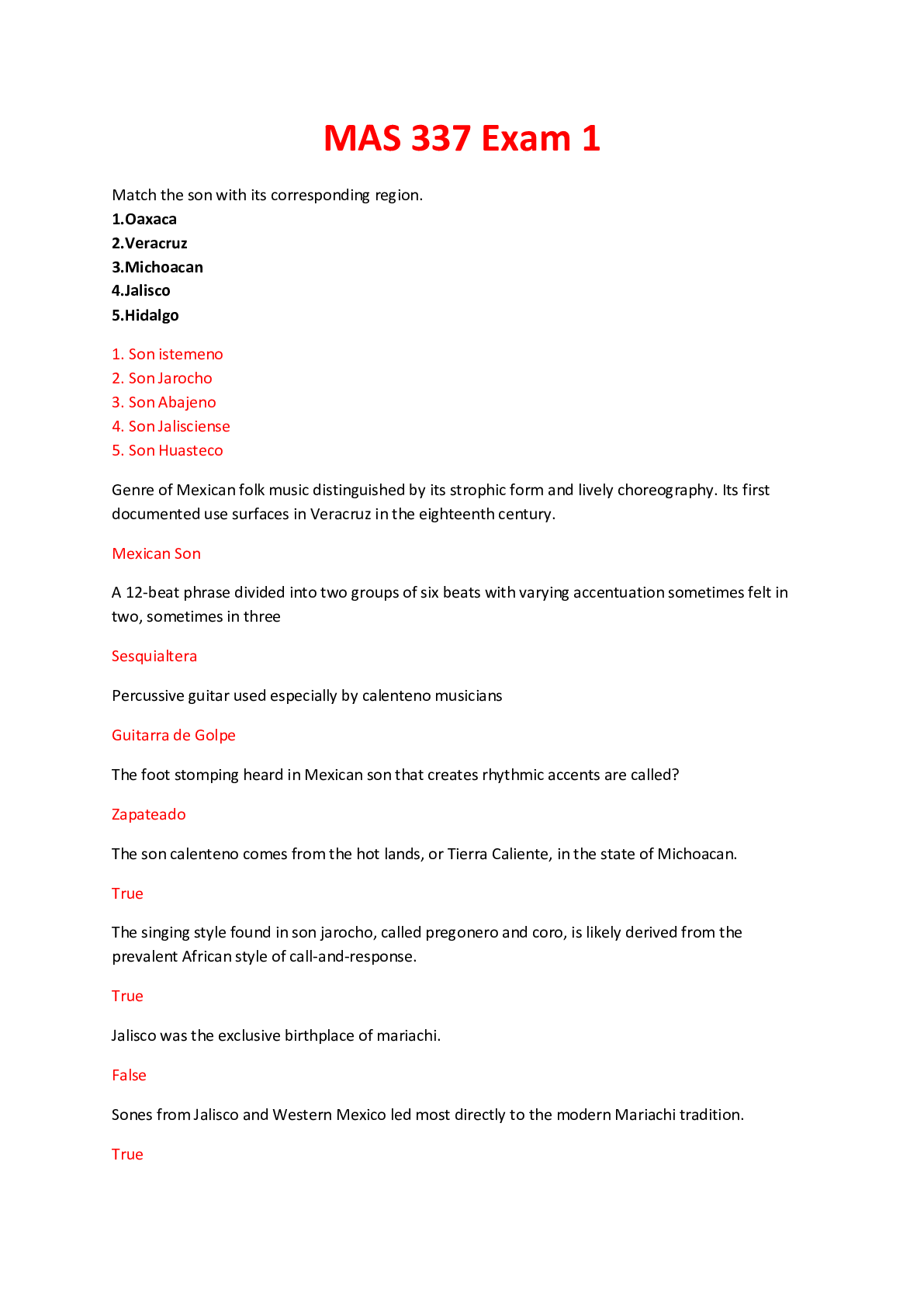
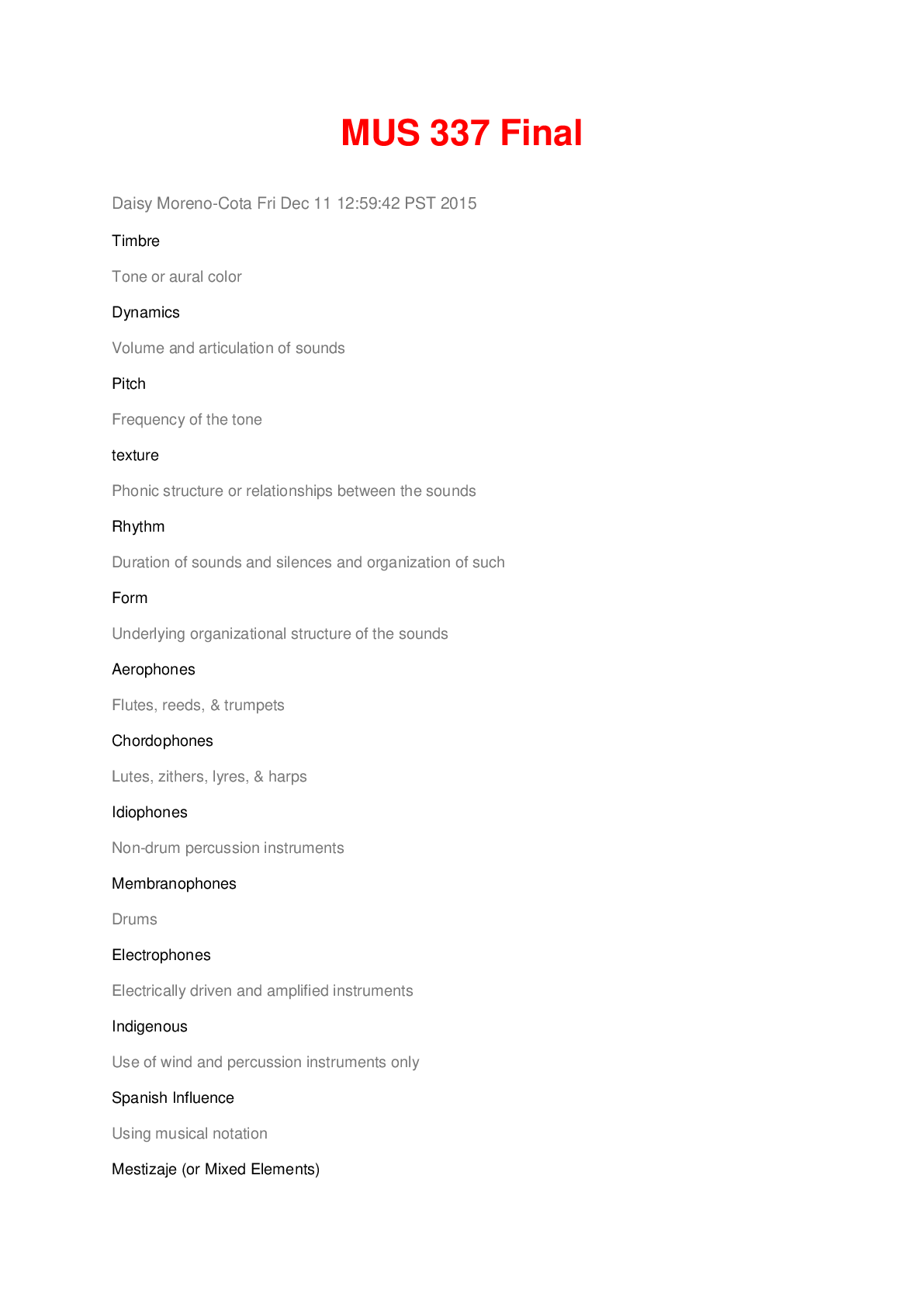
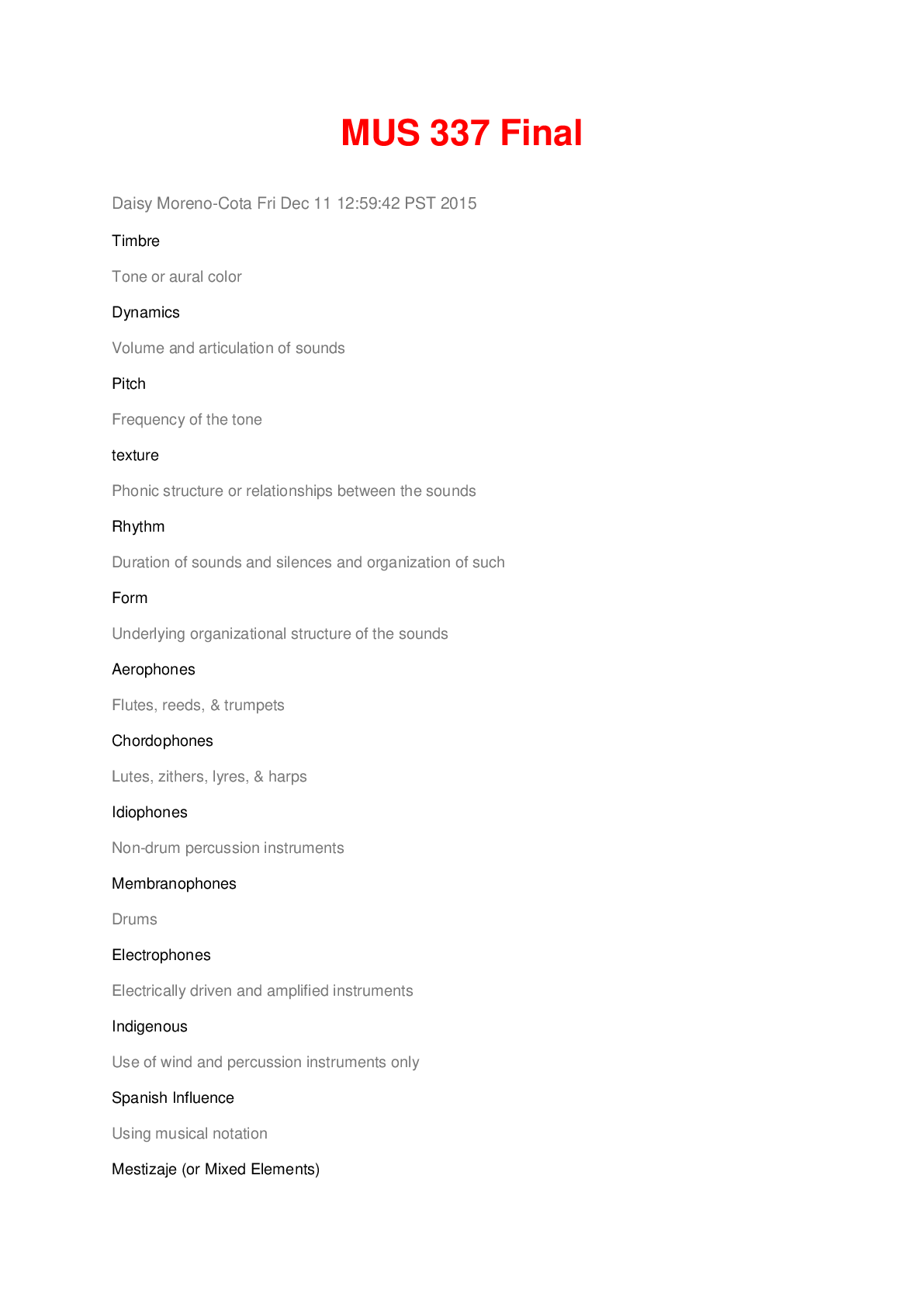
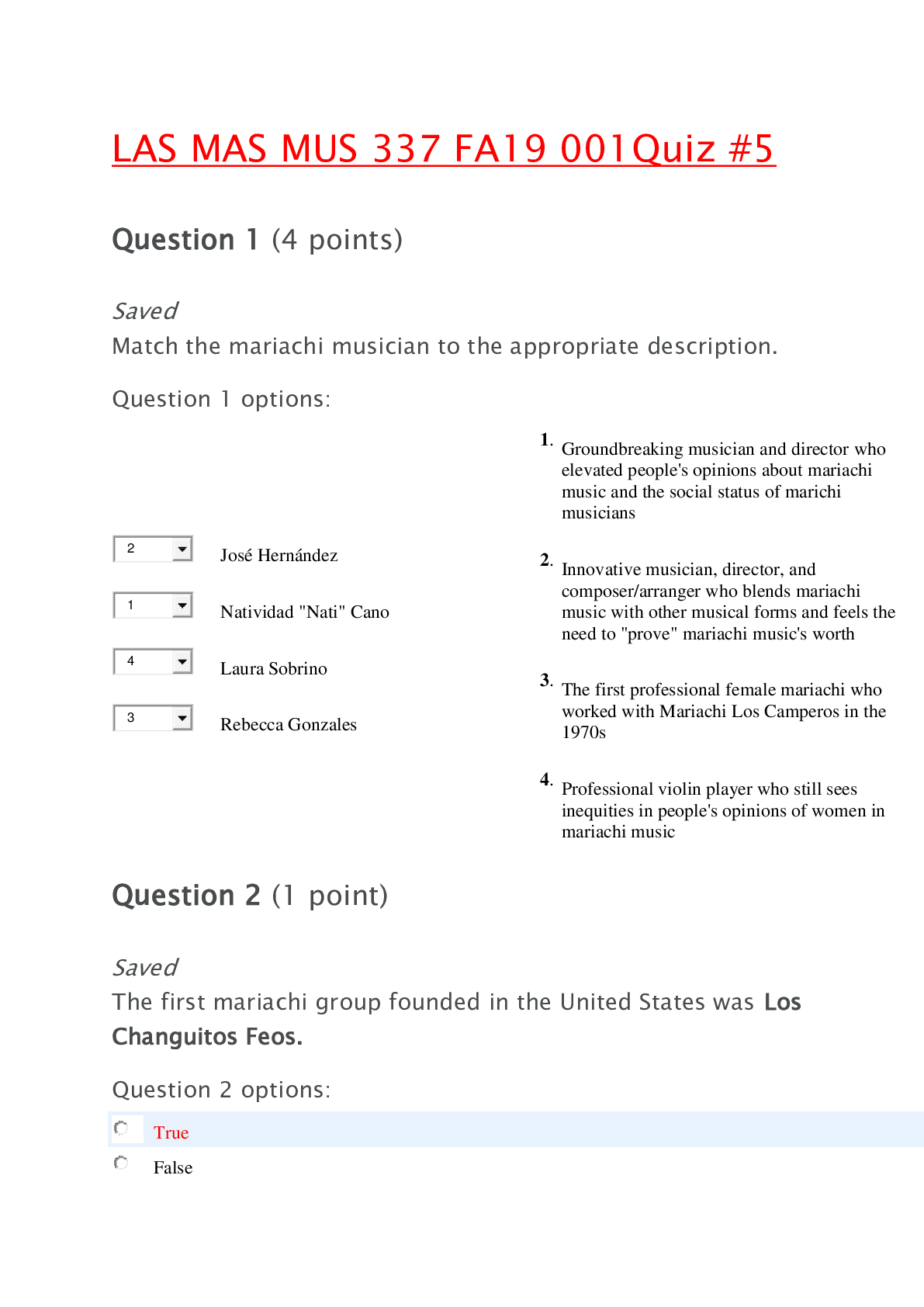
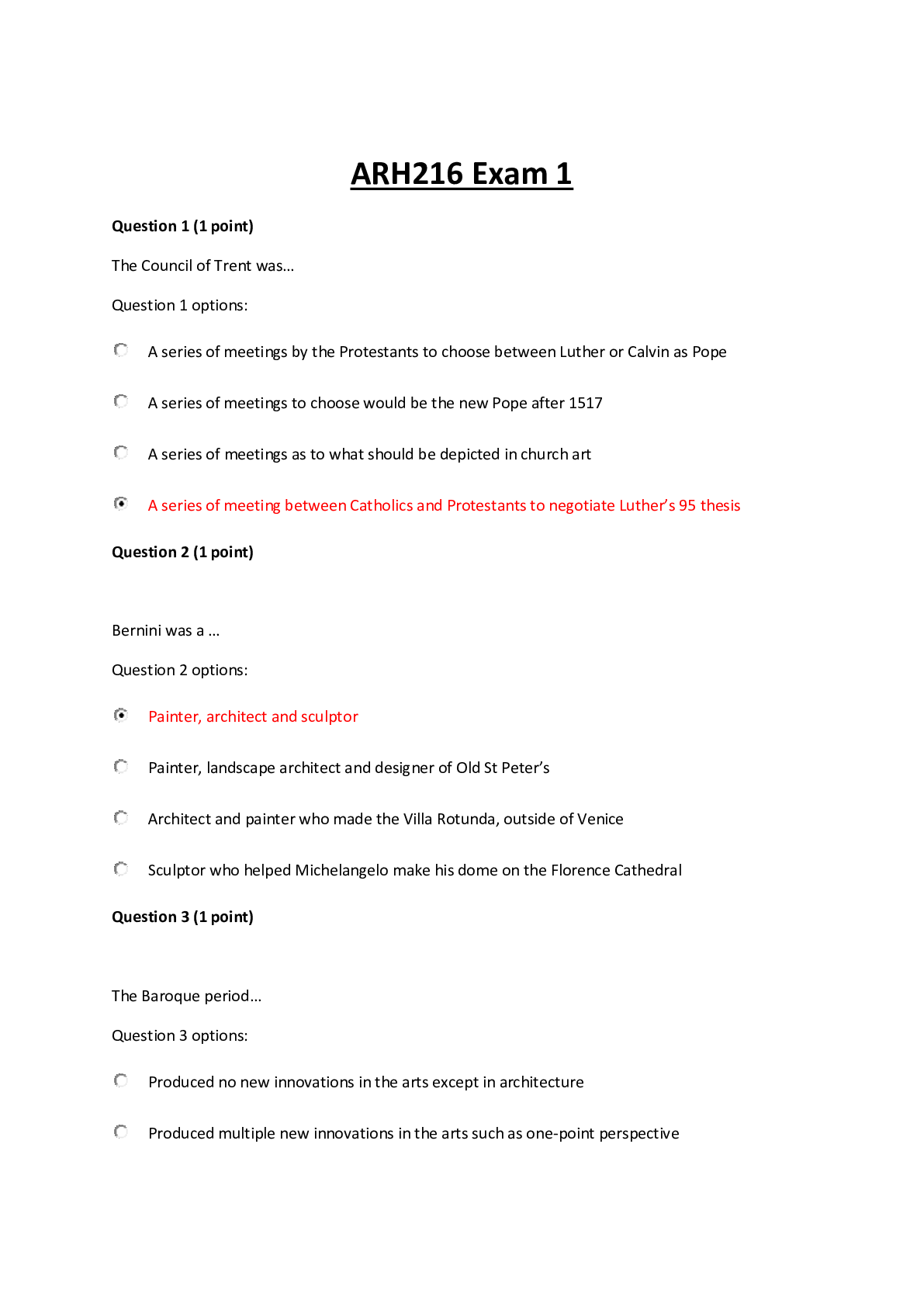
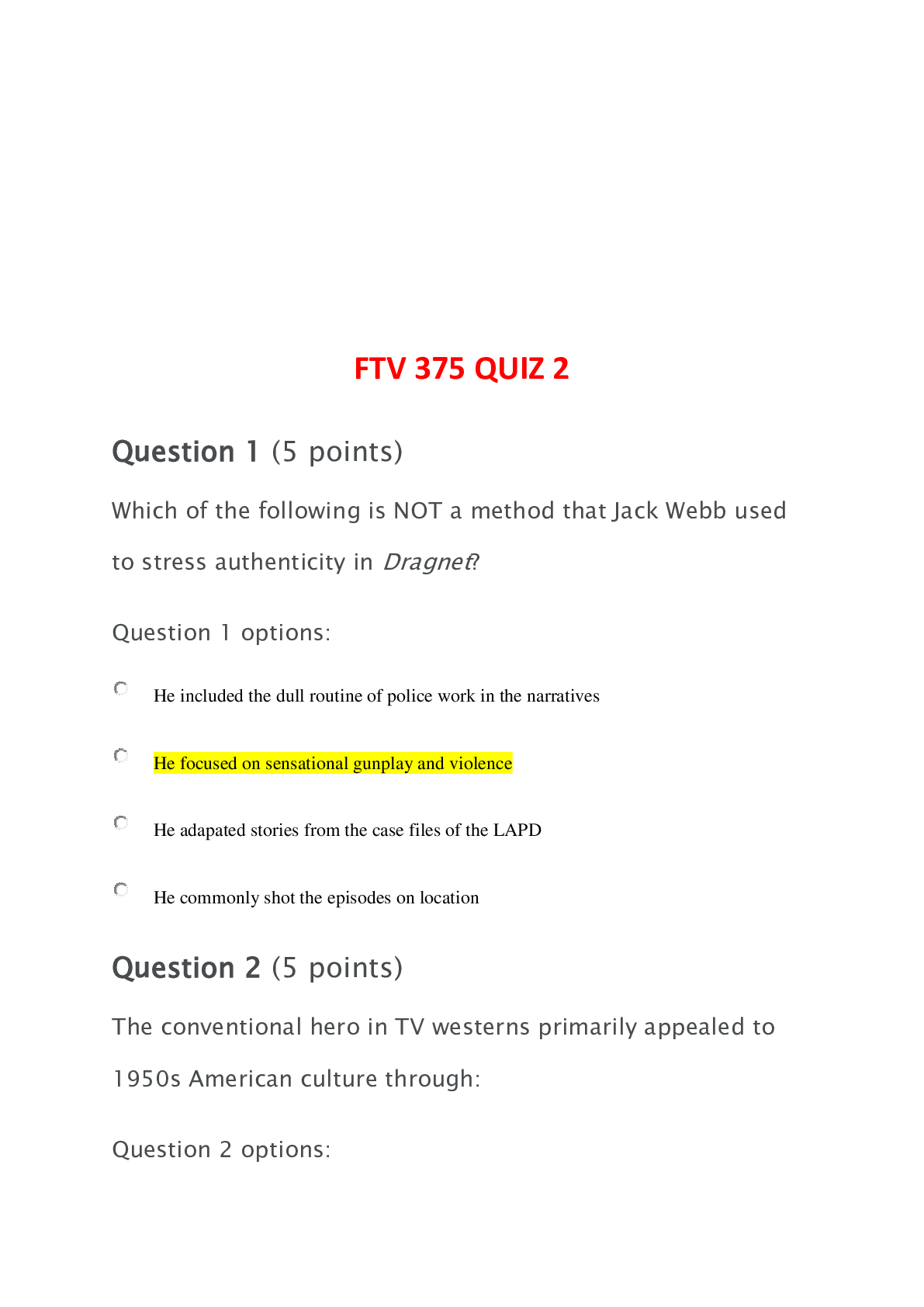
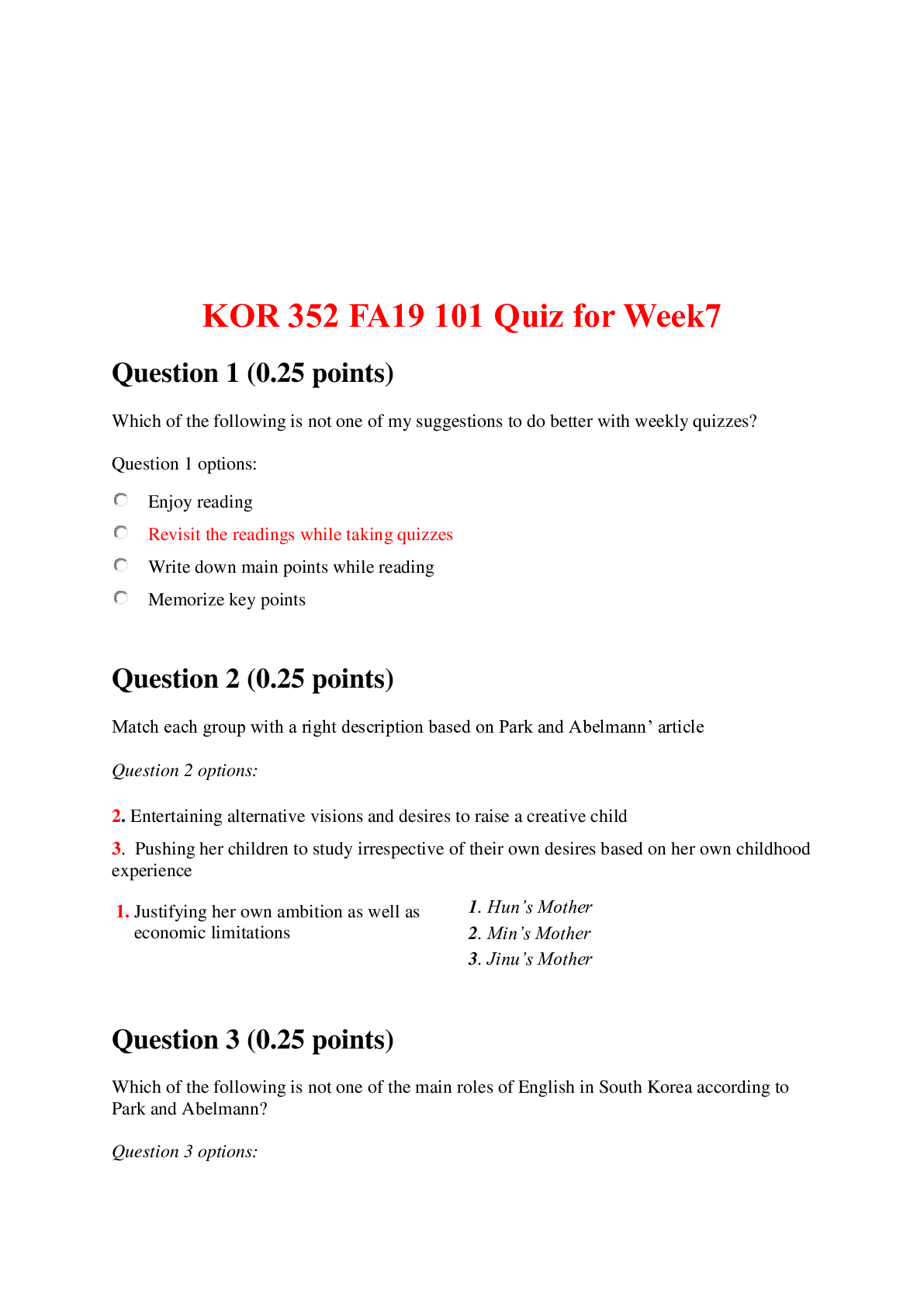
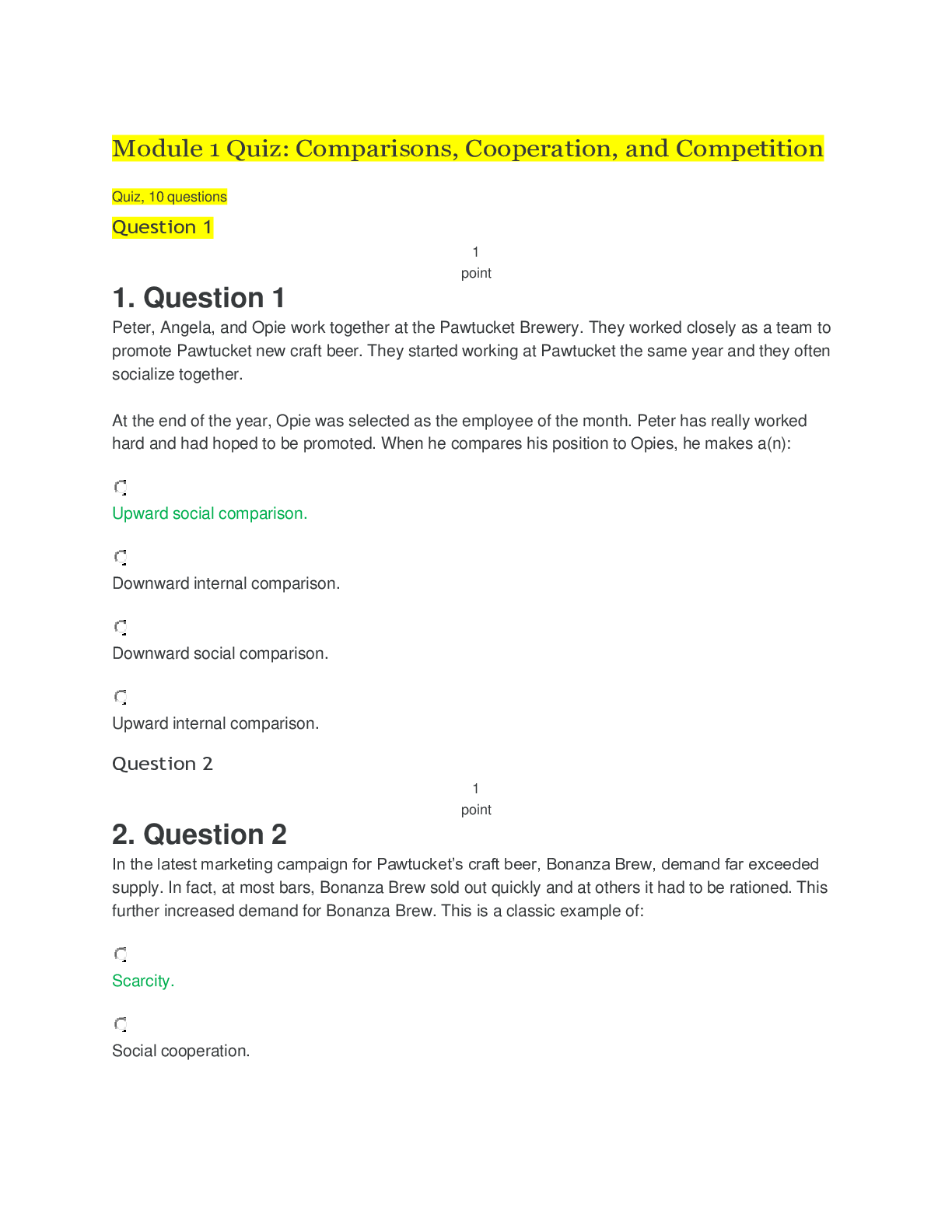
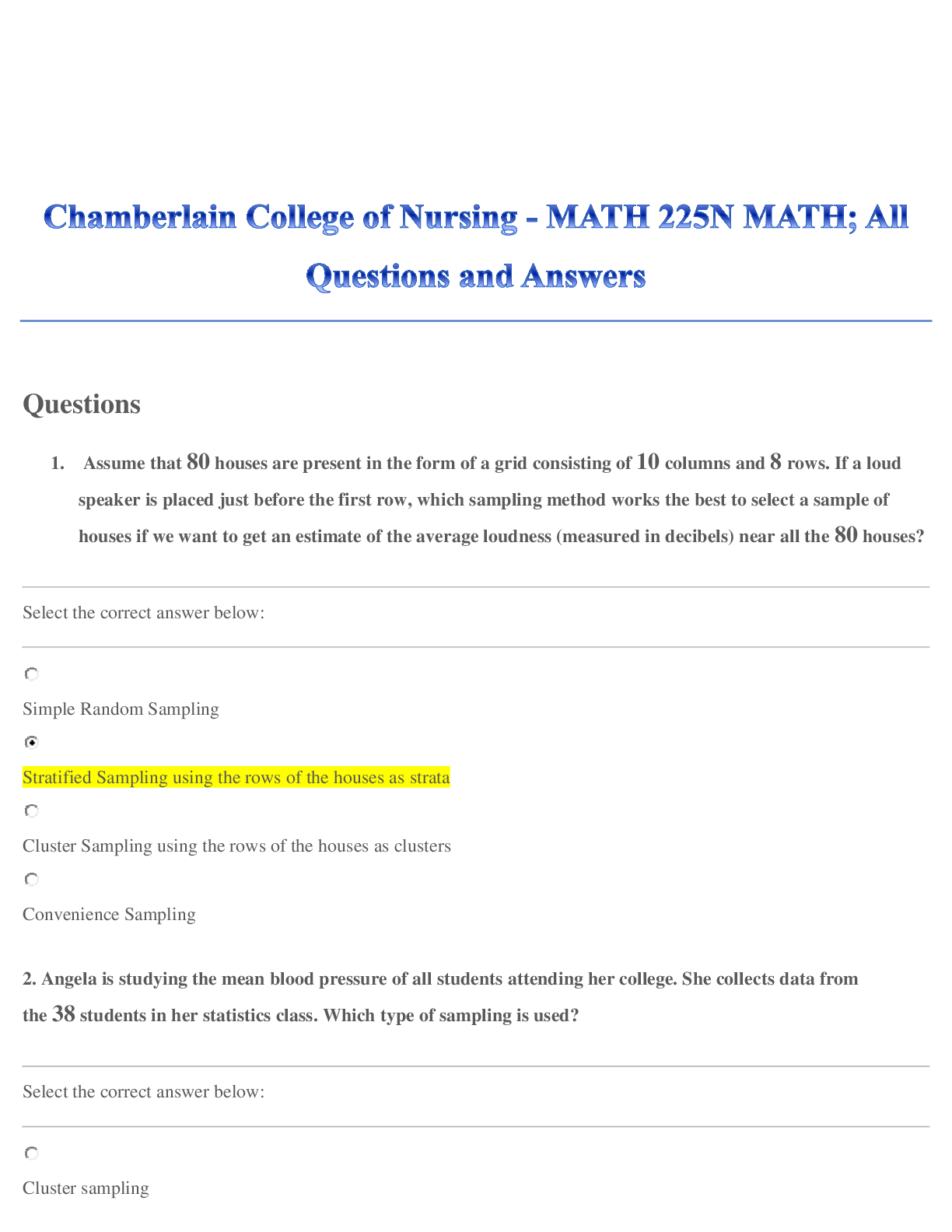
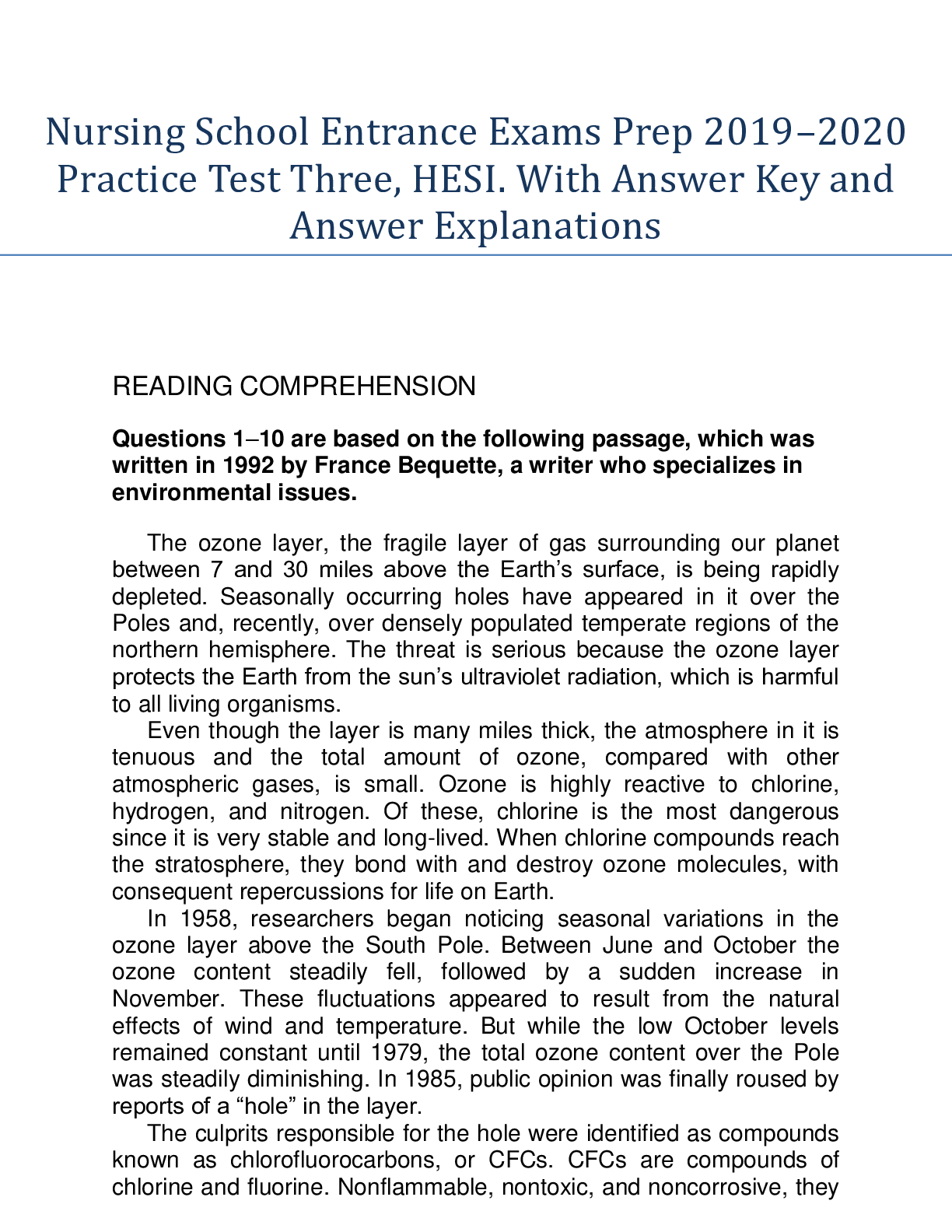
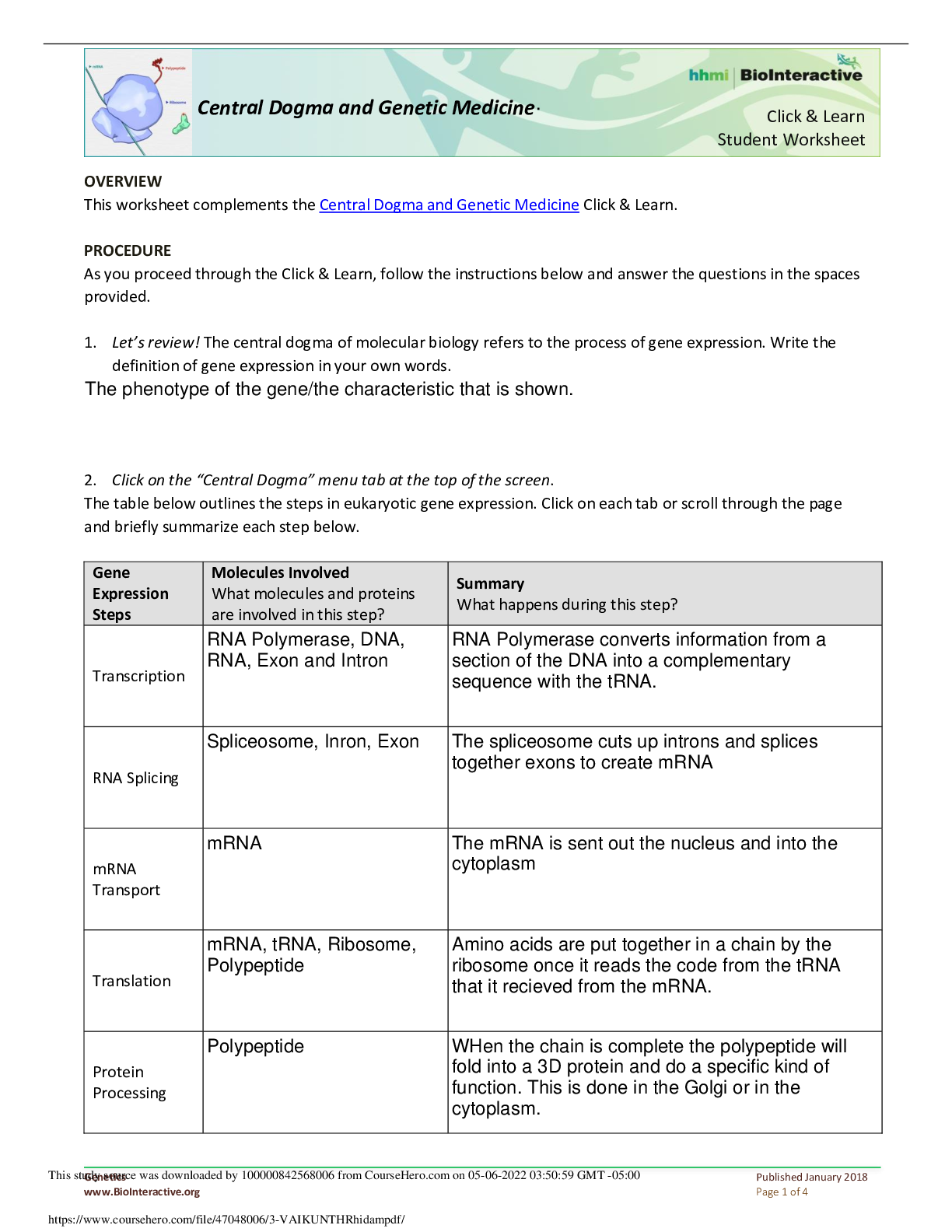
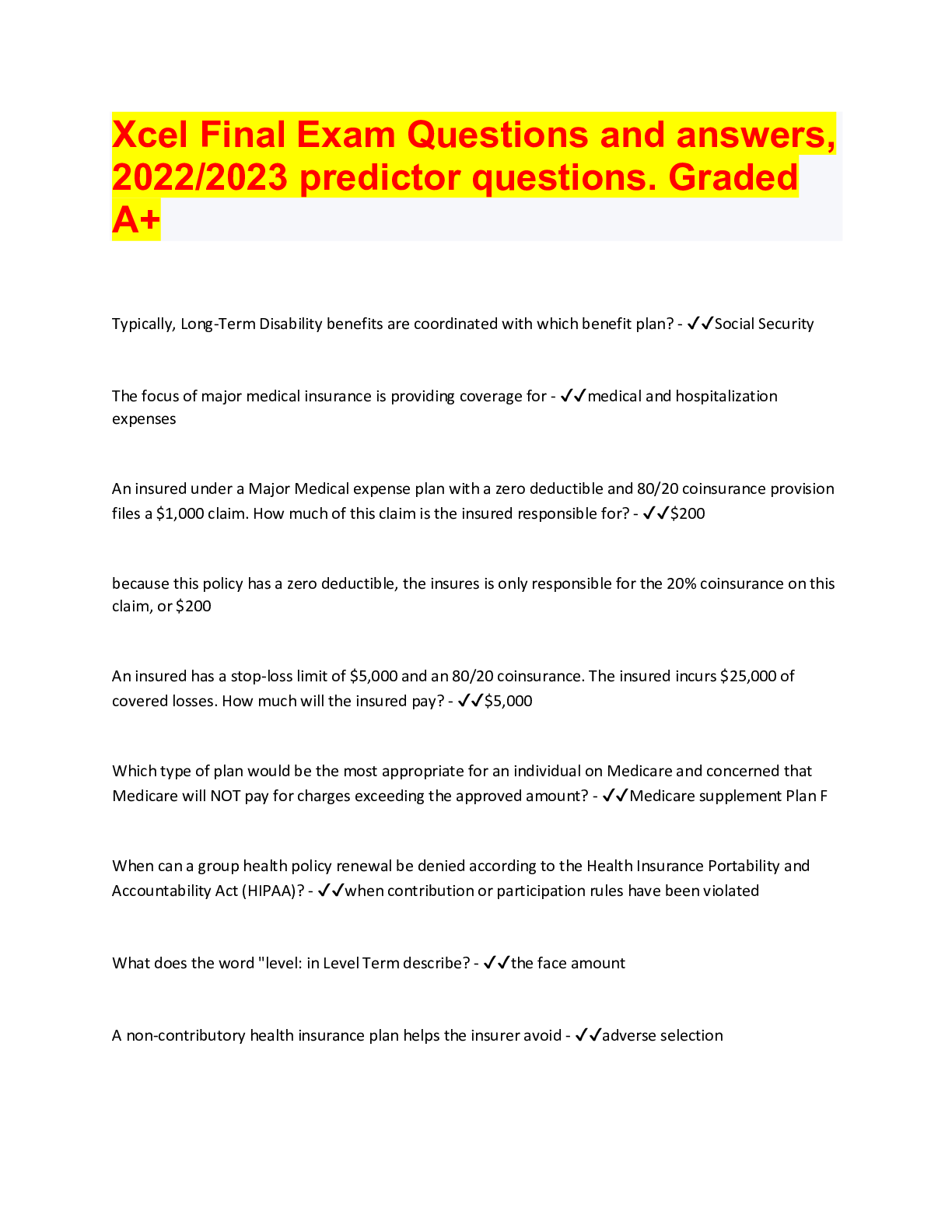
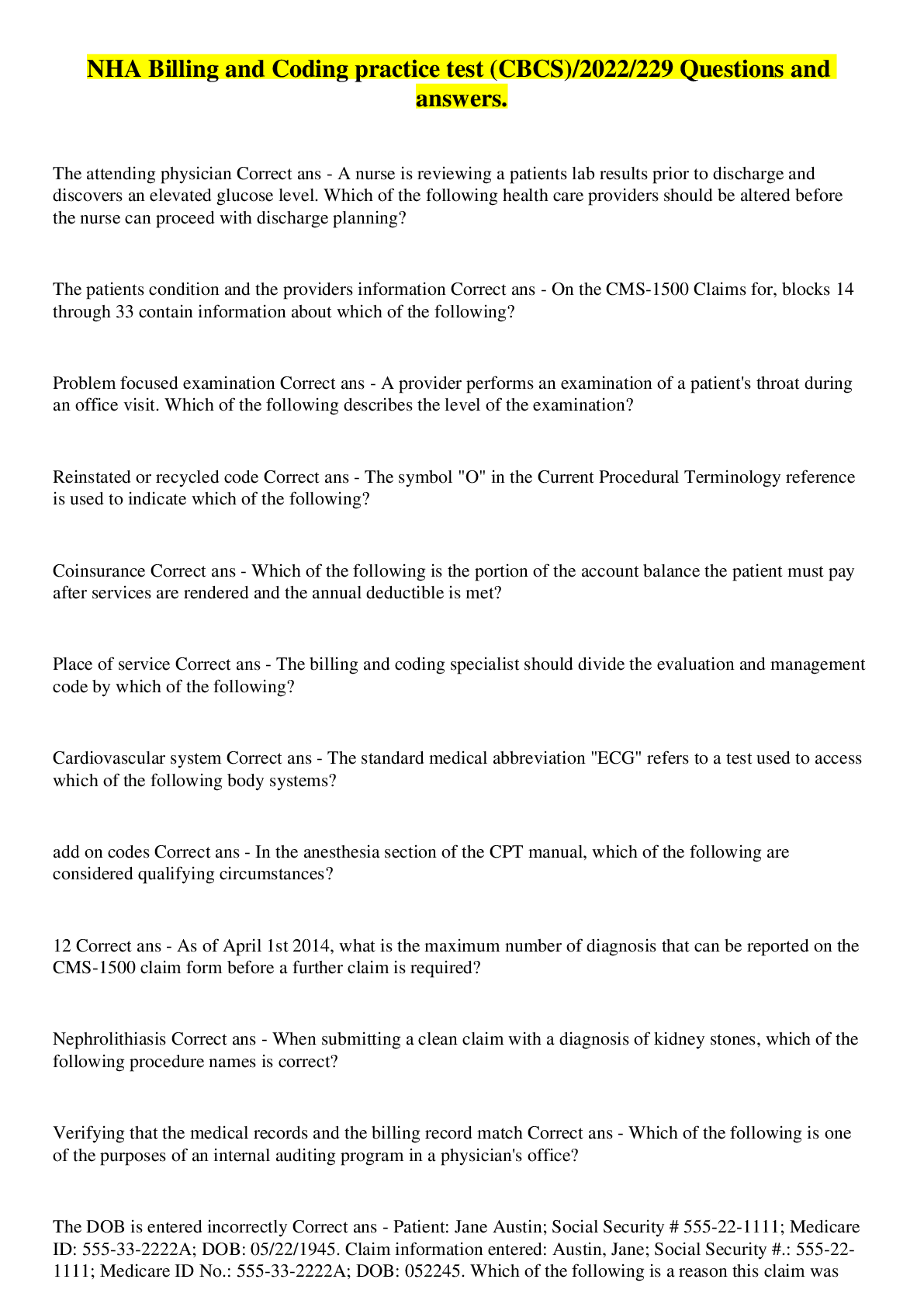
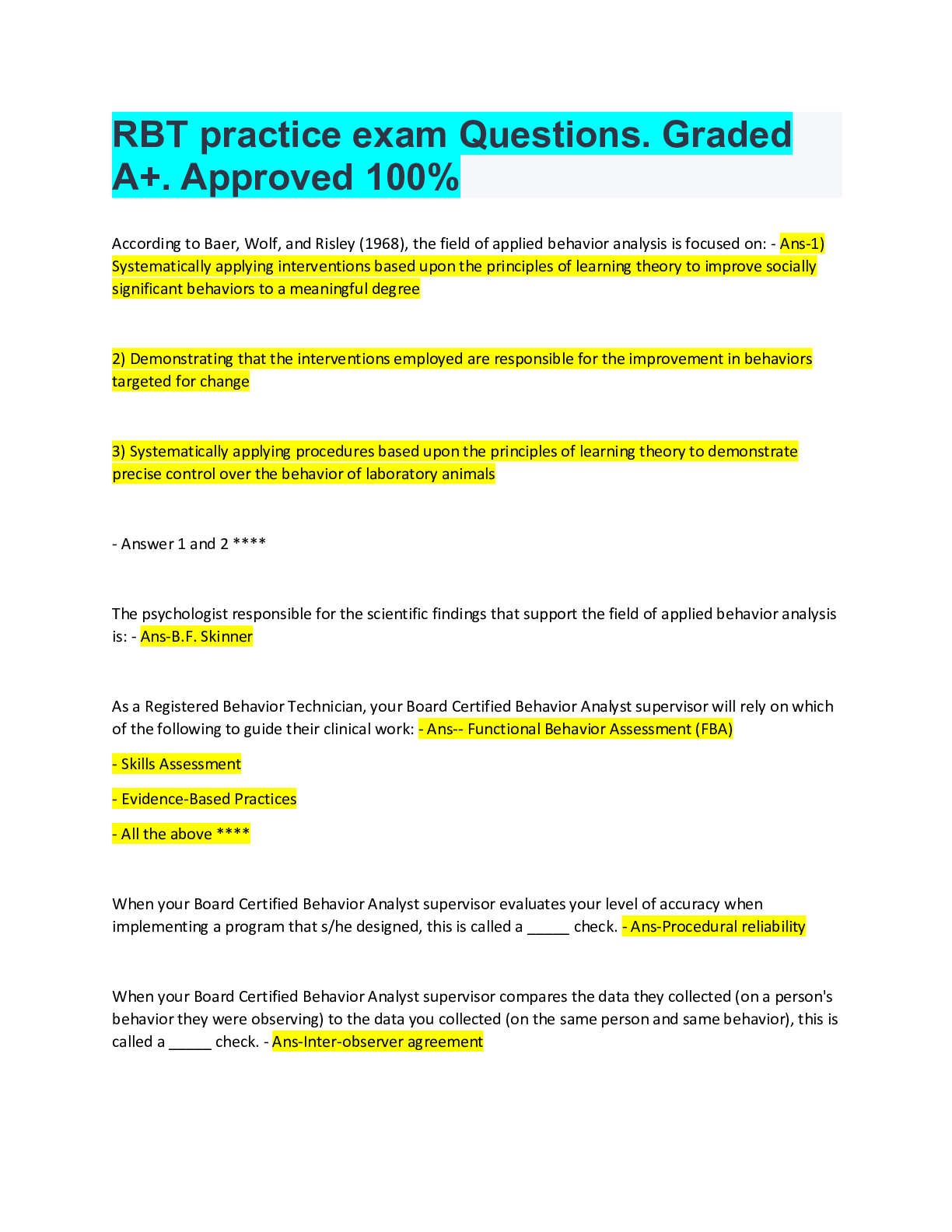

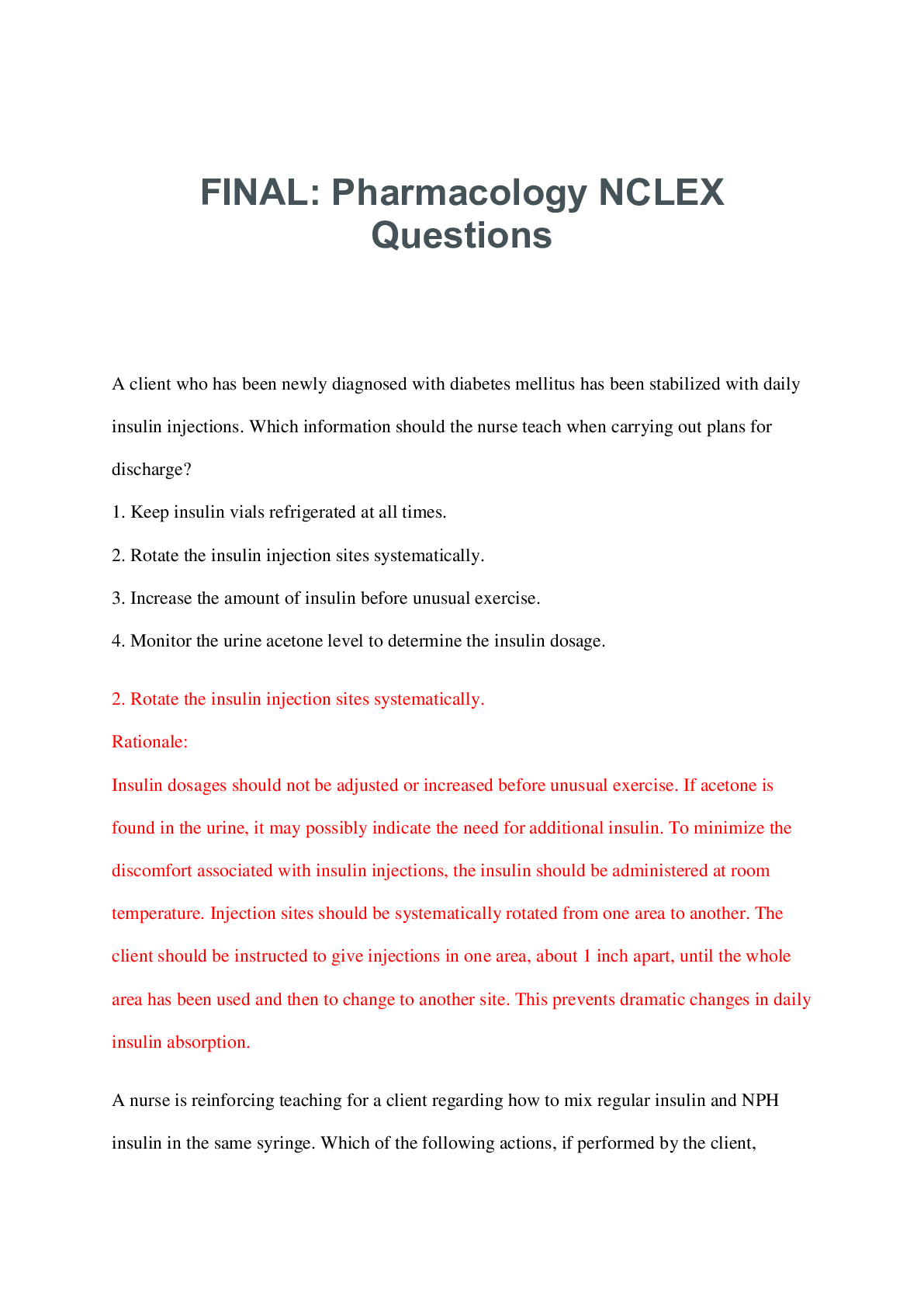
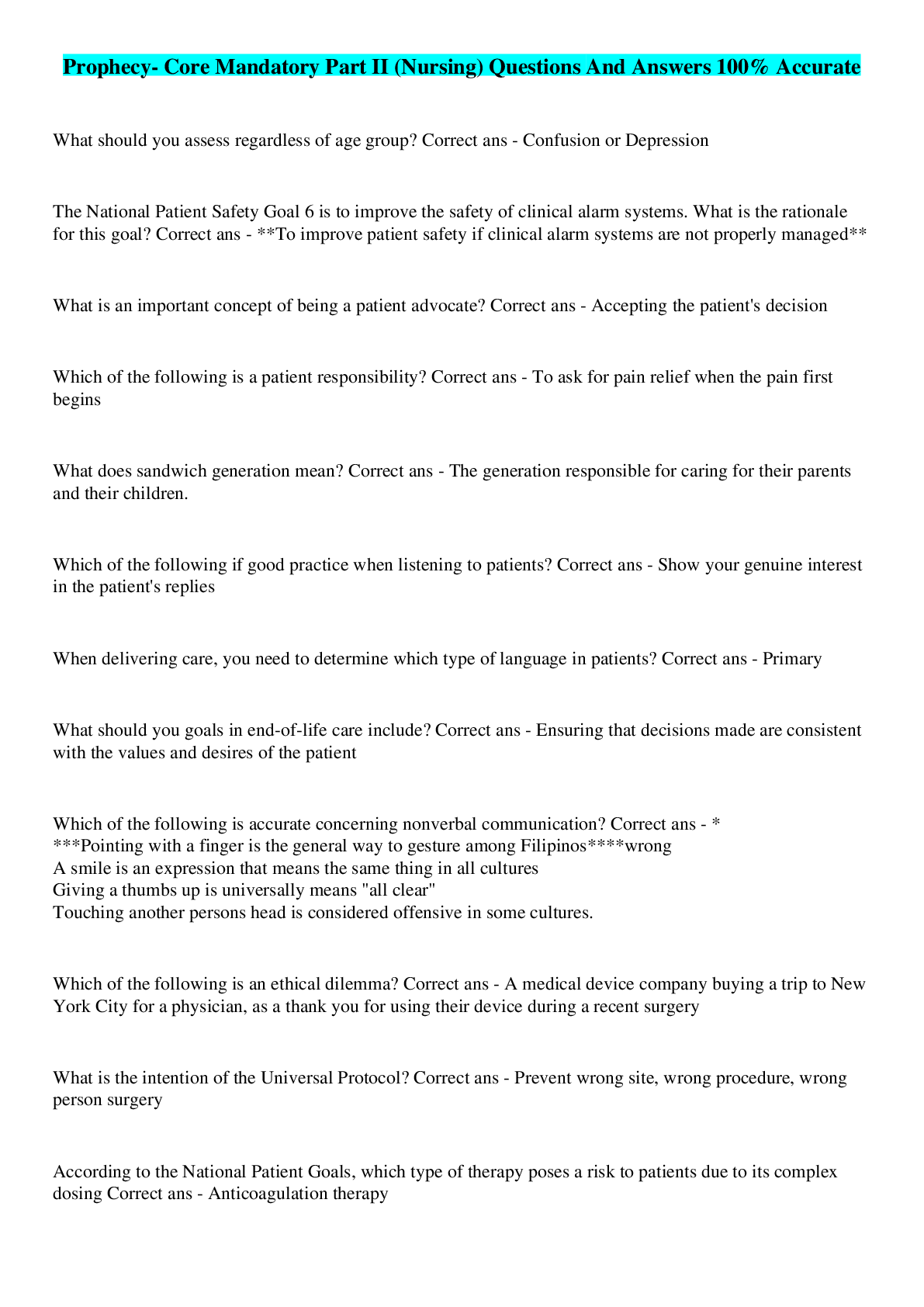
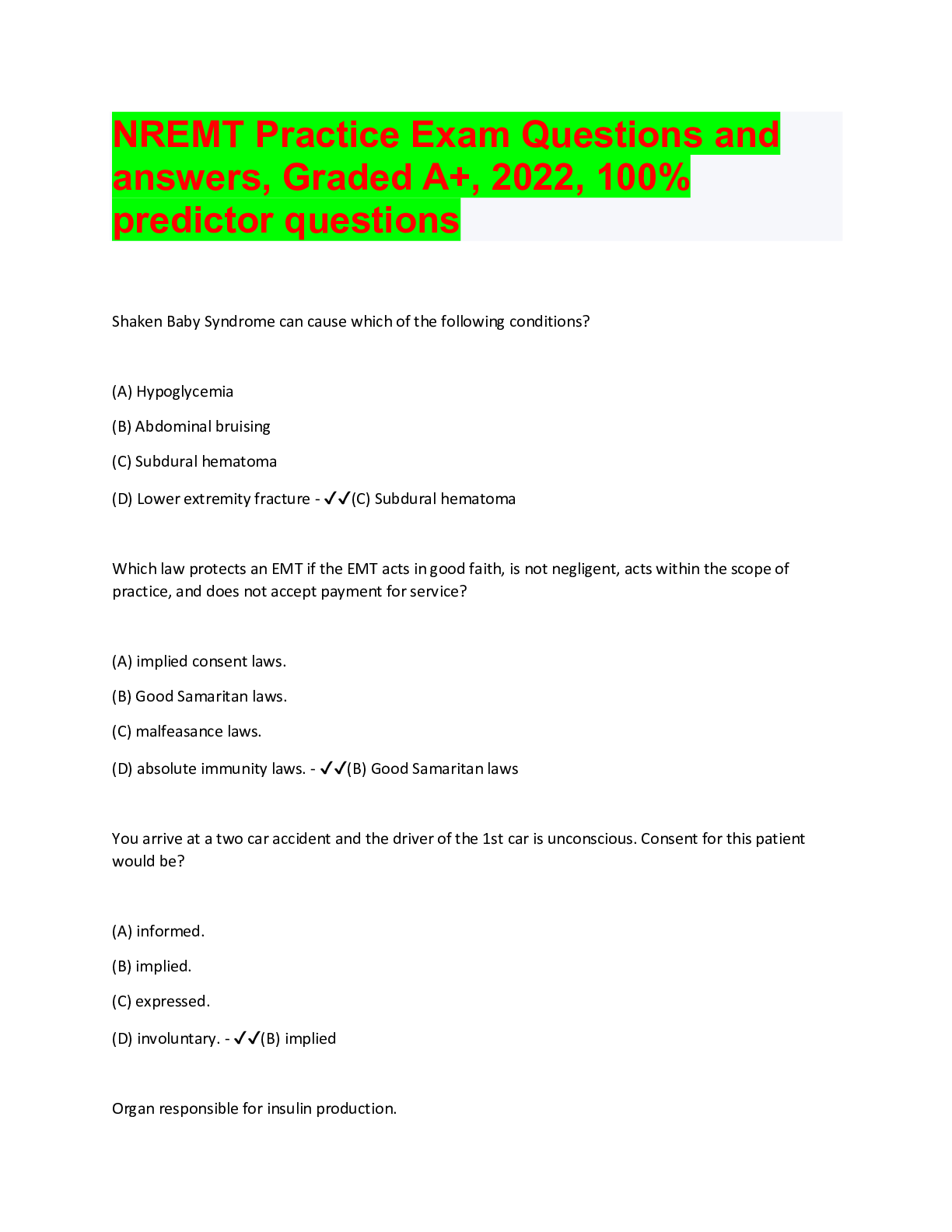
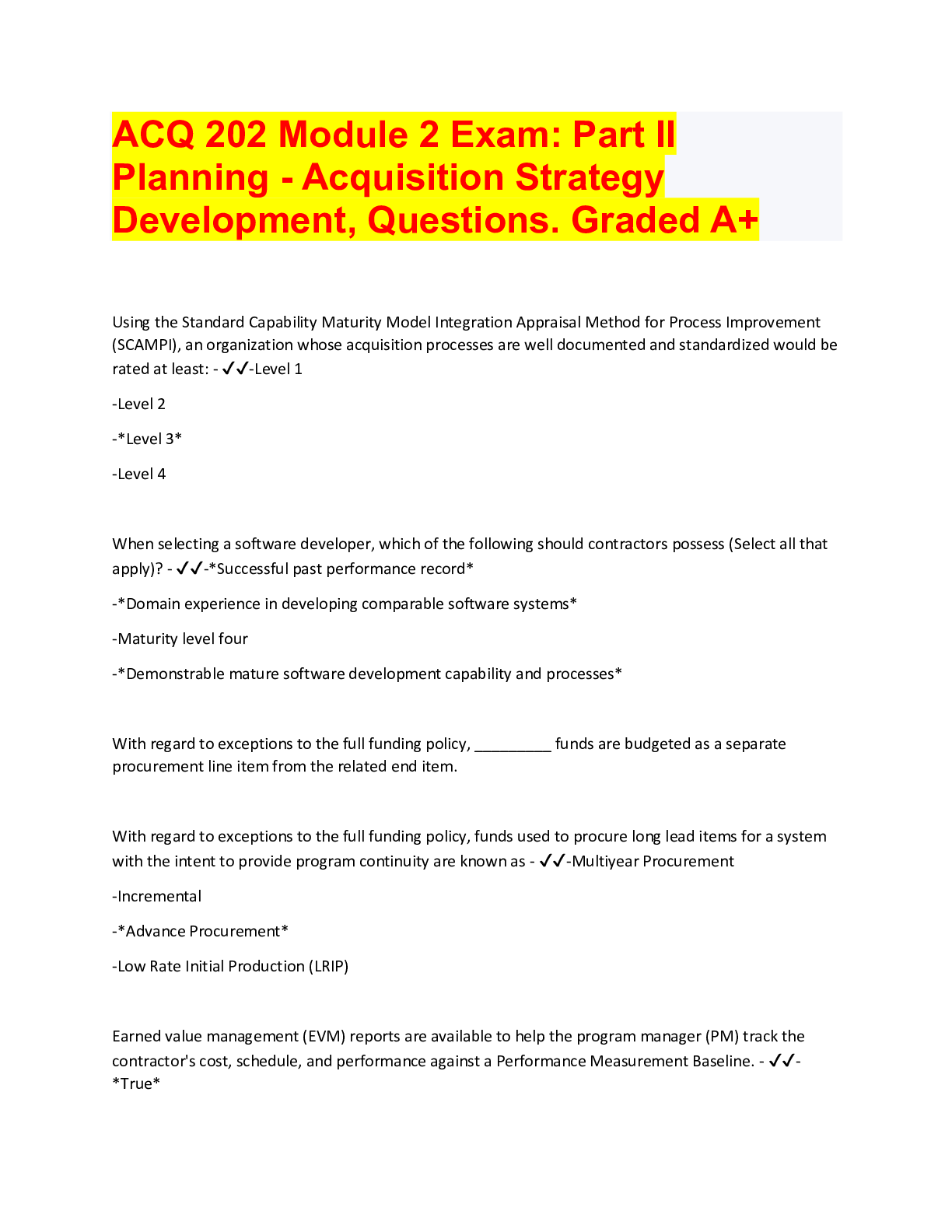
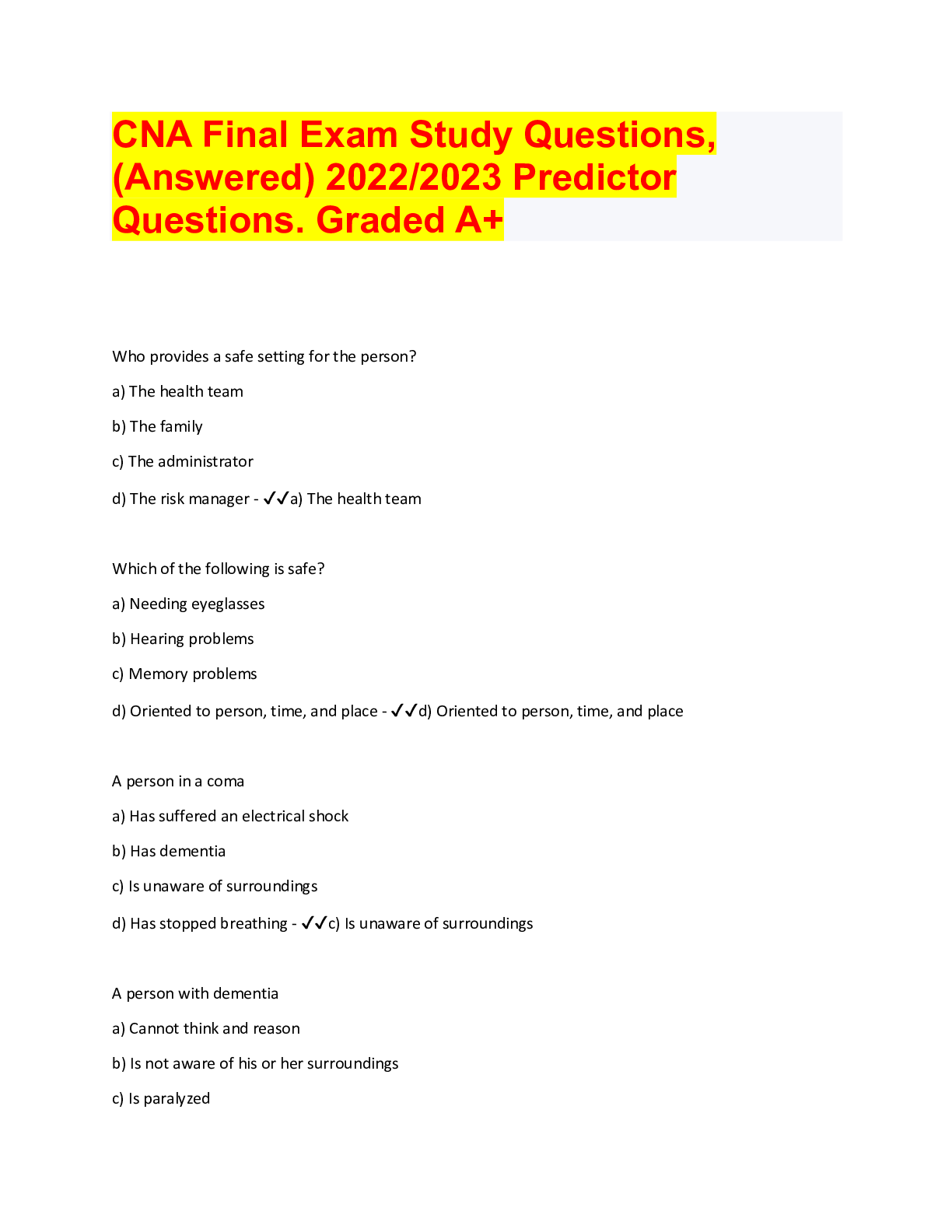
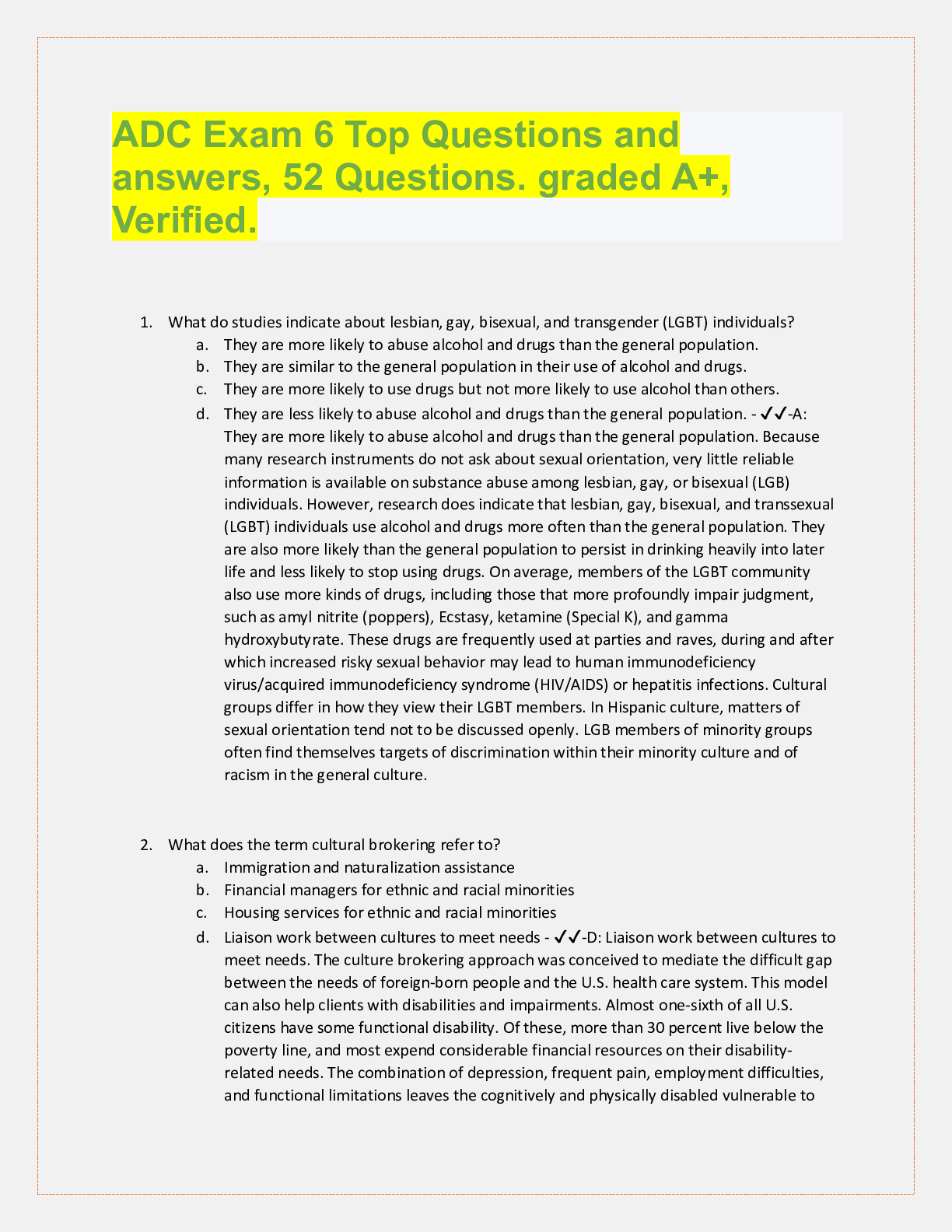
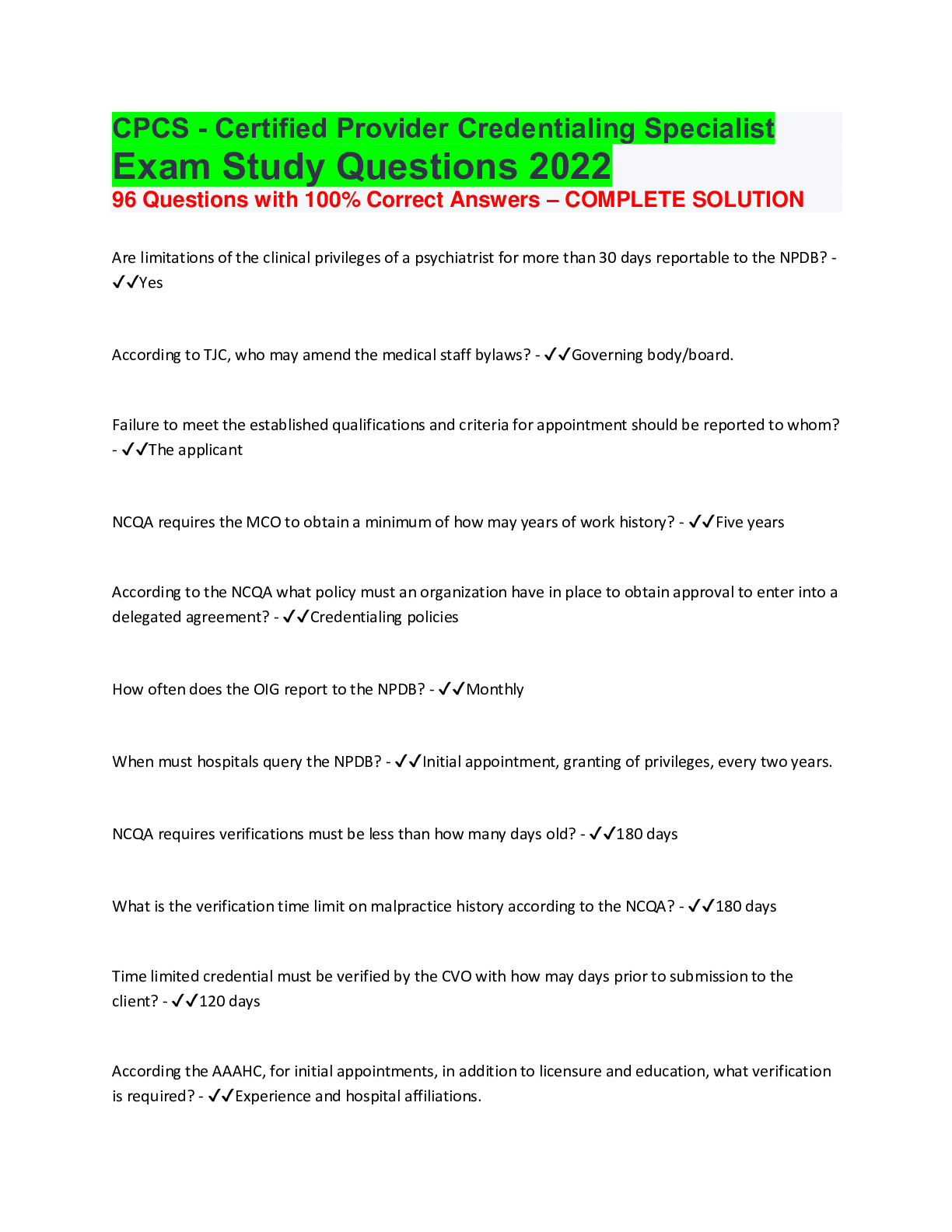
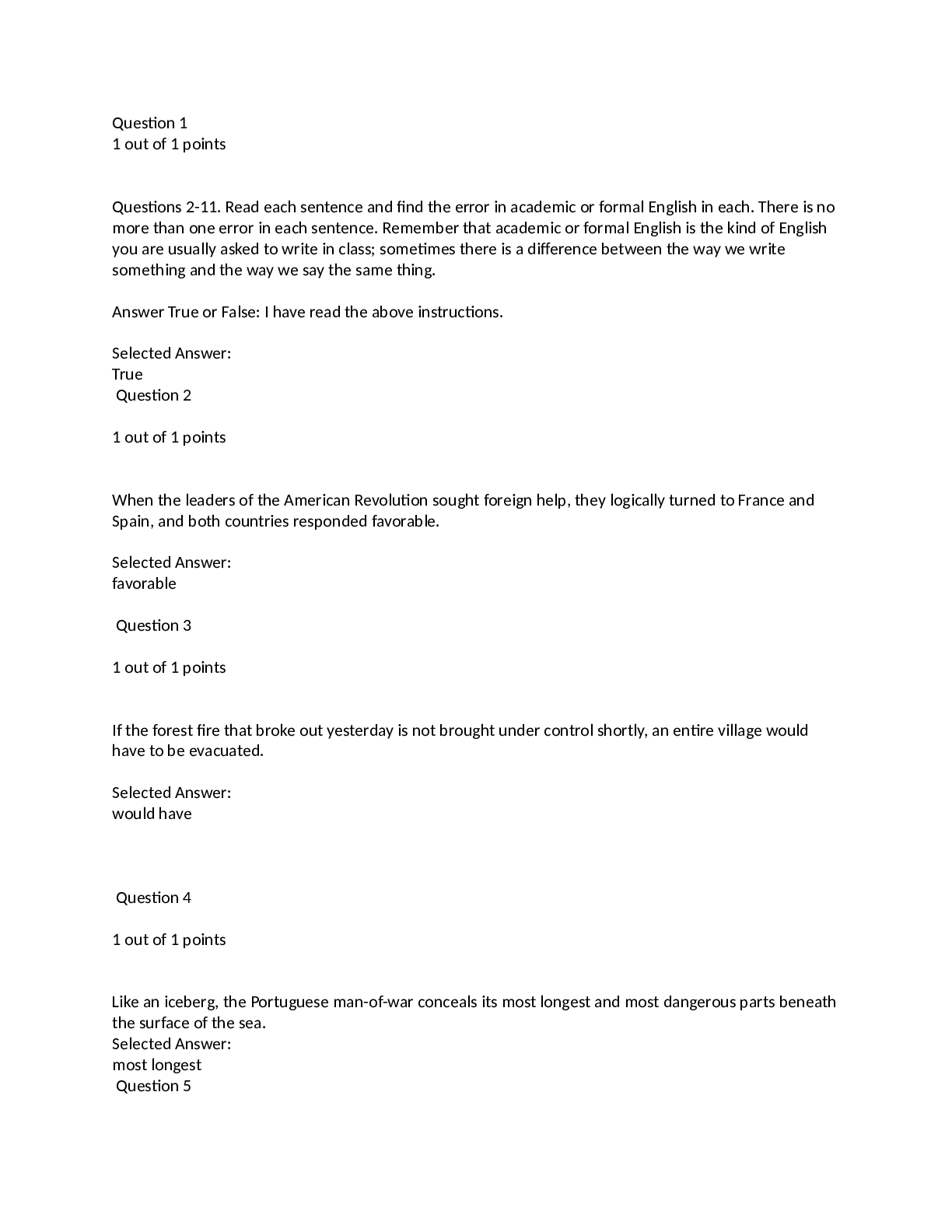
.png)
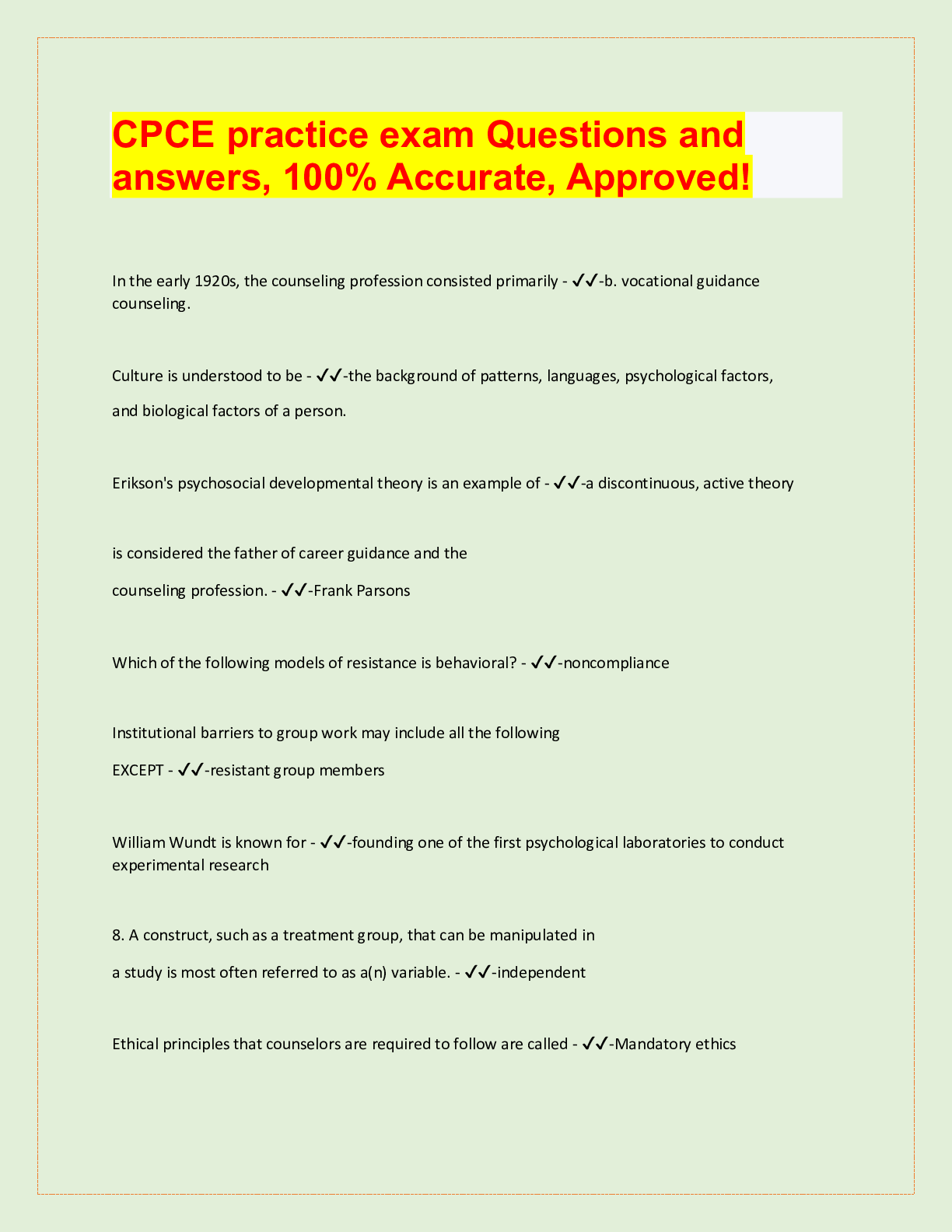
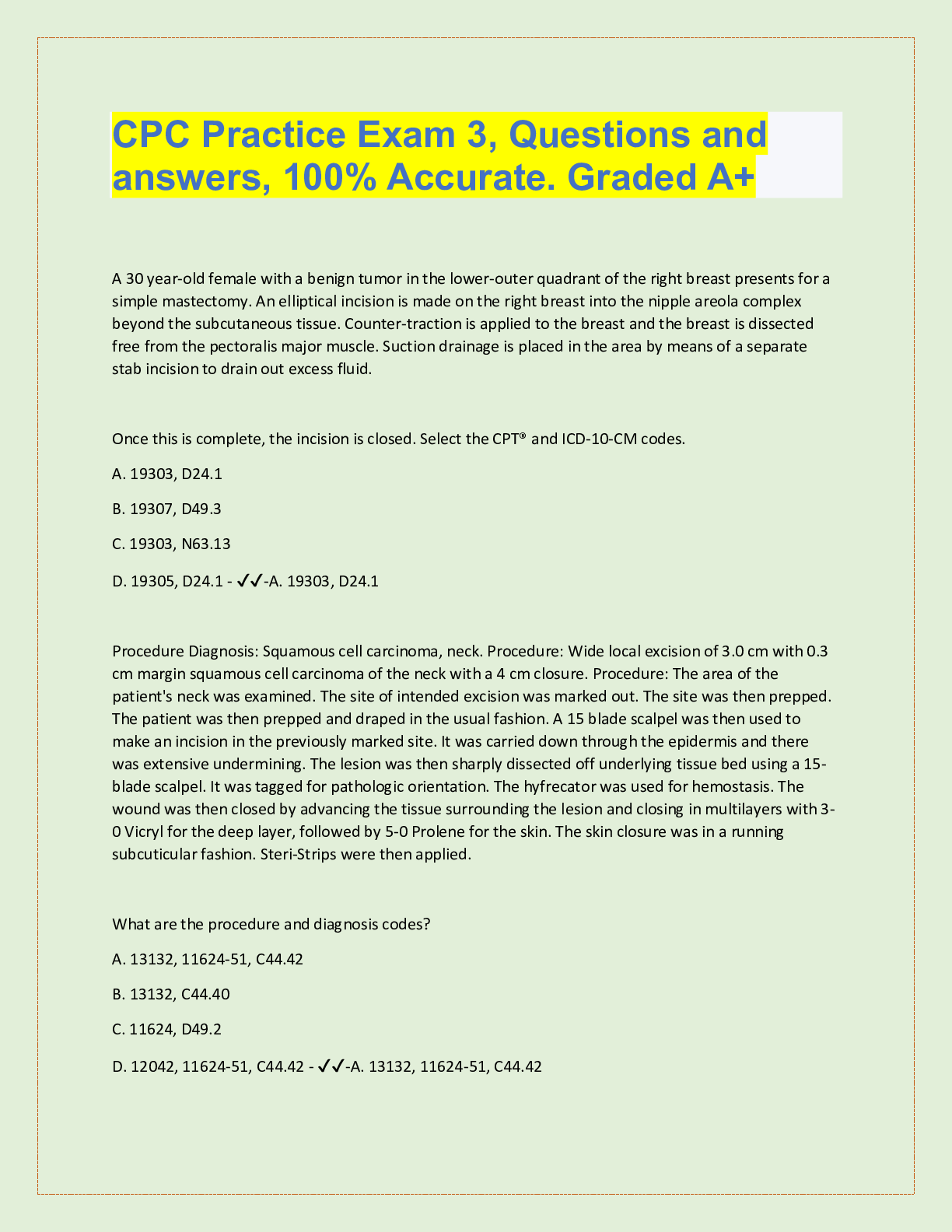
.png)

